#the only irish that did that shit did it as part of the british army
Text
I watched a 3 part documentary about how one of Ireland’s only billionnaires (I believe we have only ever had two) rose in power, went mad because that’s what happens when you’re a capitalist, comitted a bunch of financial crimes, fell from grace, and began battering people about it (allegedly). & i have so many TRICKY THOUGHTS!
like there’s a lot of people in the region where he’s from who are absolutely frantic bootlickers about him. like, people who work in the factories he started. and continue to work in those same factories. they are still are BAYING for him to take the factories back over. Because those factories are rightfully HIS and they were TAKEN FROM HIM because mumblemumble complicated legal financial shit where he was definitely in the wrong and he still owes the irish taxpayer €2 billion we’ll never get back. mumblemumblemumble
and yet. I can see the pov that there would be no factories without him. Now there would be no need for factories to prevent rural decline if it wasn’t for This Fuckin System. and yet while we are in This Fuckin System, he WAS a uniquely valuable person to his community. He DID found factories where no other capitalist was willing to build factories (war torn border region actively occupied by the british army). and that DID create jobs that kept people in the area. I wanna be a marxist about this but at the end of they day there’s a current in irish society where people would rather be oppressed by a good local lad made good than anyone else. He stayed living in the community too, sent his kids to local schools, he didn’t separate himself socially.
so people are GRATEFUL even tho they ....still have a job right now - without mr billionnaire running the factory? and therefore ... he isn’t uniquely responsible for their employment? He is still a huge figurehead who had his name over every factory door and its a lot easier to understand the “benefits” he brought to the area than the harm he did - cause the harm is diffuse and abstract while the “good” is concrete (lol) and immediate.
& like. the irish government & financial sector hasn’t ? done much fuckin good for the border communities? so when they come and “punish” the local golden boy for reasons that are tricky to understand, people get really angry? Cause the local identity is more salient than the class identity?
and the locality IS disadvantaged. it IS suffering because of being ruled from cities. but the things that would change that, properly, actually, for everyone, aren’t ............a local billionnaire.
And i struggle to navigate any of these currents, as someone with a strong local attachment but also class consciousness and a profound dislike for the injustices of the Strong Local Identity irish politics stuff. The hero worship, the sexism and homophobia and racism, the bitterness and anger and resentfulness that is always bredy by poverty. Its a twisted and fucked up culture. I am bad at navigating it despite spending most of my life living in it because i have canary in a coal mine syndrome and that makes people uncomfortable.
at the end of the day Sean Quinn personally owes me €377 and bootlickers are embarrassing.
#me fein#this is all totally apart from the bit where he (allegedly) had his former business associates kidnapped and assaulted#for the crime of ....continuing to run a successful business in an economically disadvanaged region he claims to want the best for?#check out the rte documentaries they're pretty good#irish shit
16 notes
·
View notes
Text
I still think it’s interesting that Watson is astonished that Moran was an “honourable soldier”. Also what it actually means for Moran to turn his back on that “honourable” career while Watson still seems to be a big supporter of ‘queen and country’.
I mean I know Watson was actually barely in the army before he got shot and sick and sent home so he probably didn’t get to see a great deal of the dubious shit that went on like a lot of the looting and pillaging for instance but can he really be that naïve or just so far into the patriotic/jingoistic stuff that he thinks soldiers can’t do bad things and that Moran is the first ex-soldier to ever ‘go bad’? Why is the idea apparently so astonishing to him?
And sure it’s not absurd to think that Moran may be a thief or something himself but then a lot of that looting and pillaging and stuff... maybe he wouldn’t exactly be looked down on for doing that. Whatever he did to make India “too hot to hold him" was something out of the ordinary and that was looked down upon by the British. It seems to me to be far more likely that part of the reason Moran turned his back on the army and his “honourable” career was because he was disgusted by the behaviour of the British and the British army in India and elsewhere (and let’s not forget that while Moran is English by birth, he’s almost certainly of Irish ancestry. I don’t think he’s an Irish patriot by any means but I certainly don’t think he cares about the British/English either).
I’m not saying actually Moran is totally selfless and Watson is the real bad guy here but it’s the same as with Holmes, even when they bend the law themselves sometimes and even when they aren’t part of the actual official police or legal system, Watson and Holmes are still helping to prop up a system that was... actually kind of screwed up, and they aren’t exactly critical of the British empire and the monarchy and all of that. Moran (and Moriarty too) is the one who goes against that; maybe in turning his back on his “honourable” career in the army Moran was actually genuinely behaving far more honourably.
I don’t know, I just think it’s fascinating to consider that the ‘villains’ are not really the bad guys, they’re only really considered the bad guys and truly “dangerous” because they directly rebel against the norm and the status quo and because they are a threat to that.
11 notes
·
View notes
Text
i listened to a podcast abt the belgian king leopold ii + his genocidal rubber operation in the congo + there were two different journalists who did investigative pieces + exposed the atrocities in the press + leopold paid a bunch of newspapers to basically write puff pieces to crowd them out. n the host of the podcast said leopold knew the atrocities wld eventually be exposed but he didnt care bc the profitability of his rubber exportation was time limited so all he cared abt was delaying the repurcussions until hed already gotten what he wanted.
this reminds me of like a thing tht i feel like i see everywhere that depresses the hell out of me in part bc a lot of ppl dont seem to see it as a problem @ all which is like frank discussion of social injustices or atrocities tht happened well in the past. it seems so progressive + affirming + inspiring of hope, but often its not. ppl who want to deny or downplay the existence of homophobia today wont necessarily find it hard 2 speak intelligently + compassionately abt a gay bashing tht happened in 1983. nor will the mainstream media or public consciousness shy away from it. there are very popular films in the US from the 50s tht condemn racism, but they often take place in the 30s or prior, not confronting the racism of their own time. i feel like its a massive explanatory factor fr why so many films abt gays are historical too.
+ also obviously more serious things, like the CIA admitting to the coup in iran in 2013. or the british gov only starting 2 apologize for the shit they pulled in the troubles like five yrs ago or so. + its so hard looking around + seeing some of the awful things happening 2day + knowing that eventually states will accept culpability + apologize, but it wont mean anything. it wont change anything. the irish government are gna be so apologetic + thoroughly accept accountability for the horrors of direct provision, or all the ppl who died from covid in nursing homes, but in like 2040. thats pretty much meaningless. it wouldnt be meaningless if they did it now but by then itll be meaningless.
its doubly upsetting bc if u think abt this critically there is absolutely no reason the british army or the cia or any government anywhere wont continue to act cruelly + to allow or cause untold suffering + countless avoidable deaths, but often theres enough of a feeling of disconnect btwn past + present that ppl assume what happened then couldnt happen now
it reminds me of sth i read abt how theres no good reason to think domestic abuse rates are lower now in the UK than they were in the 60s. but i bet almost everyone wld guess they are.
#its like another example of political mirroring of domestic strategies of abuse.#abuse cw 18282#death cw 181#racism cw 181#genocide cw 18182
2 notes
·
View notes
Text
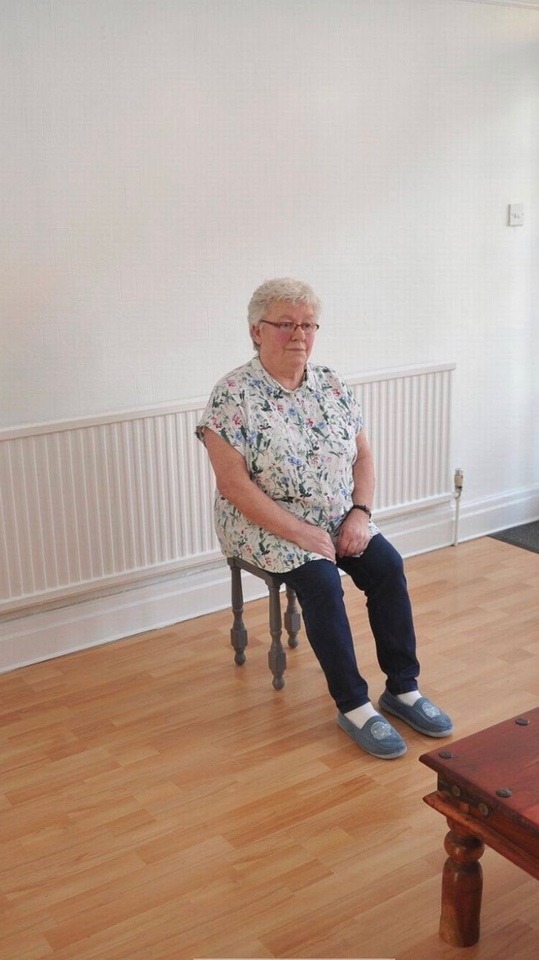
The Irish right after cheering for the demise of colonisation to then be lumped into a post about Europeans being colonisers
#the only irish that did that shit did it as part of the british army#and theyre not irish theyre british#theres two distinct identities over here#nobody gives a shit about us unless its to get drunk so i dont expect everyone to know this stuff#but yeah we didnt do that shit so
0 notes
Text
The Old Guard (Laurel/Nyssa; M) - part i
Ships: Laurel/Nyssa
Summary: Laurel Lance and Nyssa Raatko are happily married - and have been for centuries. Along with Helena Bertinelli, this immortal army follows their equally immortal leader, Dina Drake, in the fights that they think are right.
But after one of their comrades makes a fatal lapse in judgement, Laurel and Nyssa find themselves trapped in their very worst nightmare - captured, as nothing more than lab rats. Luckily, the team has also just found its newest member, Sarah Diggle, so maybe all isn't lost.
A/N: Okay! So this one is something I've been working on a while. It was only meant to be 5k, but is now on 11k and still not done. So I will probably post in two or three parts.
You don't need to have watched The Old Guard for this to make sense - it follows the movie in terms of plot, but I'm hoping at least that the characters are still recognisable from Arrow.
Read at AO3
Laurel heard the knock on the door first, jumping to her feet. She had been curled around Nyssa on the couch, who was immersed in a novel she’d bought at the airport, but Nyssa quickly followed Laurel’s suit, putting the book down on the coffee table.
When Laurel opened the door, her face immediately split into a smile at the sight of Dina. “Hey, stranger.”
“Hey yourself,” Dina replied, going in for a hug, and then laughing as Laurel lifted her off her feet. Helena came in after Dina, closing the door behind them both.
“You look great, boss,” Laurel told her. “Love the hair.”
“Thanks! You, on the other hand, look okay,” Dina said with a grin.
“Gee, I love you too.”
Dina moved to Nyssa, who was waiting patiently for her hug, which was returned with gusto. Laurel smiled as Dina patted Nyssa’s cheek in greeting.
“You want some tea?”
“Make it Irish and I’m in,” Dina said, and Laurel shook her head fondly as Helena reached into her purse for her flask.
“On it.”
“While you both ruin your livers,” Laurel said, going to the mini-fridge, “I have something for you, boss.” She unearthed a small container from beside the fridge.
“Oh yeah? Please tell me it’s halwa.”
“Five hundred, Helena,” Laurel said, and Helena grinned.
“All in, I see.”
"Excellent," said Dina. "I'm starving."
“No, come on -” Nyssa said but it was half-hearted and she couldn’t suppress her smile even if she wanted to.
“Let’s settle this,” Laurel said firmly, handing Dina the container. Dina shook her head fondly as she sprawled on the armchair and uncovered a large square of Dina’s favourite sweet.
“All right.” Dina took a bite. “Mmmm. So good. Okay. Sesame seeds and tahini. Walnuts, not pistachios...” Helena let out a low whistle. Laurel refused to look defeated yet, though, and continued to pace. “Honey... okay, my guess? That Turkish place we went to in Rabat in - when was it? 2004?”
“Holy Mary, mother of God,” Laurel muttered under her breath, as Helena grabbed the money in front of her and waved them around Laurel’s face with glee.
“On the money, every time,” Helena said, and Laurel was still smiling, somehow, as she glanced at Nyssa, who hastily tried to cover her laugh with a cough.
“Next time, habibti,” Nyssa said, as Dina shook her head with faint exasperation.
“You say that every time,” Laurel complained.
Dina nudged Laurel playfully. “Don’t be such a baby, Laurel.”
“Admit it, boss,” Nyssa said, “you missed us.”
Dina didn’t hesitate. “I did.”
Silence fell as their fun and games came to an end, and as if to punctuate the point, Helena dropped a file on the coffee table. “It’s a job.”
“We don’t do repeats, Helena -”
“But we could do some good, Dina,” Nyssa interrupted, rather uncharacteristically. “Lord knows the world needs saving.”
“Why by us, though? Why should we feel like we owe this shithole of a planet anything?”
“Maybe,” Laurel said gently, “maybe we at least owe it to ourselves to hear Waller out.”
“Amanda Waller?” Dina asked, sitting up a little straighter, and Laurel was encouraged by that.
“Yeah. She’s ex-ARGUS now. Works freelance.”
“I don’t know,” Dina insisted. “I just - have a bad feeling about this. About what this could do to us.”
“I get that,” Laurel said, ever the conciliatory voice, “and that’s why Nyssa and I will have eyes and ears on you when you and Helena meet with her.”
It was clear from Dina’s sigh that she was relenting. “Fine.” Nyssa caught Laurel’s eye and they smiled, though stopping short of punching the air with victory - they weren’t quite there yet. “But only to hear her out. If anything goes sideways -”
“We’ll be there to back you up,” Laurel promised. “We got you, boss.”
“Always,” Nyssa added.
*
They set up the sniper rifle in the hotel room, Laurel watching from afar as Dina and Helena scoped out the market surrounding the cafe they would be meeting Waller at.
Behind her was Nyssa, listening carefully to the chatter of the market below.
"You have to admit," Nyssa said through the comms, "it's good to get back into the game."
"Not so fast, Nyssa," came Dina's voice, and Laurel adjusted her scope to better catch Dina's face. "We're hearing her out. That's what was agreed. Don't count your eggs and all that."
Helena laughed. "Chickens, boss. It's chickens."
"Chickens? I take it that means you would like to order the chicken shawarma?" Amanda Waller came into view, and it was strange for Laurel to see her in anything other than a sharp suit - Waller was dressed in a leather jacket and jeans, rendering her virtually unrecognisable.
"Just a coffee is fine, thanks," Dina said, extending her hand to Waller for a shake. "Dina."
"Amanda," Waller replied.
"I almost didn't recognise you there without your power suit, Amanda," Helena said, shaking her hand too and then taking her seat at the table.
"Got to blend in, I suppose," Waller said, speaking in a British accent.
"I thought you had to be American to join ARGUS," Dina said, and Waller laughed.
"Indeed. I was born in Star City. Then I went to live with my mother in Cornwall. Went back to Star City many years later and the rest, as they say, is history."
"Why'd you leave ARGUS?"
Wallet grimaced. "I needed some time off after my husband died."
Dina shifted uncomfortably in her chair. "I'm sorry for your loss."
"Thank you," Waller said with a perfunctory nod, Laurel could see, but also with the air of not wanting to talk about it. Laurel didn't blame her.
"So how can we help you?"
Waller spoke at length about the mission she wished to send the immortals on - a school being held hostage in Azerbaijan, in dire need of rescue. Laurel watched Dina's expression and knew from her face that they would take the job. Once actual people were involved, especially kids, it was hard for their leader to turn it down.
"Given the… delicate political situation in Azerbaijan at present, our priority is getting the students out alive," Waller continued. "Money is no issue - Miss Bertinelli and I briefly discussed your going rates -"
Dina got up, rather abruptly. "We'll invoice you when it's done," she said.
"Good," said Waller, also getting to her feet when Helena followed suit. "Thank you for doing business with me."
Nodding briefly, Dina downed her cup of coffee in one, then gestured for Helena to follow her. Laurel watched through her scope, focusing again on Waller, who unexpectedly raised her hand to wave and smile, as if looking directly at Laurel.
Laurel huffed a laugh, shaking her head, then nudged Nyssa beside her to take a look. They shared a smile of mild exasperation but the warm kind.
"What do you think, habibti?" Laurel asked softly.
"I think we would be blaspheming if we did not use the blessing God gave us to do as much good as possible," Nyssa replied after a moment. Laurel felt the familiar tug of love in her heart at the woman at her side, so much so that she couldn't help but kiss her.
"Your heart," Laurel murmured, placing her palm against her wife's chest, "is so full of kindness. Overflowing, in fact. This world is unworthy of it."
"Get a room, you two," Dina said over the comms, at the same time as Helena saying, "You two make me want to vomit", and Nyssa and Laurel dissolved into laughter.
*
It was terrifying when everything went wrong.
To be surrounded by soldiers armed to the teeth, who not only shot them repeatedly but used the four immortal women before them as target practice - it was fitting, in a way, for Laurel to be on the ground, dead, when shit indeed went sideways.
They'd practiced this. They had had centuries to perfect playing dead, using the deadliest weapon of all in their immortality - pinpointing the precise moment their enemies’ grip on their weapons were relaxed.
Of course, there was no way to practise being reborn, no textbook that could predict the brutality of this death or the next, and so something always threw Laurel, no matter how ready she was for those bullets - especially when it came to Nyssa. As Laurel's eyes opened, the bullet lodged in her forehead being ejected from her skin as it knitted up, Laurel immediately sought out her wife, careful to suppress her sigh of relief when she saw Nyssa's eyes open too.
Slowly, the four of them took the time to get their bearings and get back on their feet, and the soldiers had no warning when swords and arrows were unleashed on them mercilessly. Dina unearthed her axe for good measure, grunting as she finished off the last of them. They all panted, Laurel with her sword still aloft, Nyssa's bow tensed, Helena's arm quivering as she pointed her crossbow at the feebly stirring soldier at her feet.
"Everyone still with me?" Dina said, looking around. Helena made a noise of assent.
"Na'am," Nyssa said after a moment.
"Laurel?"
"Yeah," Laurel said, dislodging a bullet from her jaw with her tongue. "Pissed as hell."
"I don't understand," Nyssa said. "Where are the students?"
"We've been set up, Nyssa," Dina said grimly. “There are no students.”
"Jesus," Laurel muttered under her breath. "You were right, boss."
*
They got a freighter train towards Armenia - there was a safe house they had there, though Dina wondered aloud if they were perhaps chasing their tails. She told her team to get some sleep, and Laurel, grateful they'd all been able to change their clothes but still unable to shake the stench of blood in her nostrils, fell into a fitful, troubled slumber as she wound her arm around her wife's waist.
She saw it in flashes - the girl, in army fatigues, the military weapon, and then the dagger, appearing from nowhere, slicing the girl's throat… her hands going up to try and stem the blood -
"Ya allah," Nyssa breathed, jolted awake at the same time as Laurel - and when Laurel looked around she found Dina and Helena in similar states of shock.
"Another one?" Laurel said.
"It can't be, not that quickly," Dina said, but Nyssa was already reaching for her notebook, sketching rapidly.
"She was a black woman," Helena said. "Military…"
"The dagger was definitely Pashtun and there was a woman near her in a chador," Nyssa added, continuing to sketch.
"Gotta be Afghanistan, right?" Laurel said. "And the dog tags - Dig? Digger? Or something?"
"Could you make out the company?"
"Echo 2-1," Dina said in a hollow voice. "Gods. Why is there another one? Why now?"
"I don't know, boss," Laurel said. "What do you think?"
"I think we should find Waller," Helena said. "We're wide out in the open here. One problem at a time."
Nyssa shook her head. "No," she said, "we need to find this girl. Whoever she is - if she's like us… she needs us." Nyssa appealed to Laurel, gazing at her. "You remember what it was like at the beginning, hayati. How scared we both were. Imagine what she's going through."
Helena shook her head. "We can't split our focus -"
"We don't have to," Dina said, appearing to make up her mind and getting to her feet. "I'll go and retrieve her. You all get to Armenia. Go to the Charlie safe house there. Work on tracking Waller."
"Are you sure, boss?" Helena asked.
"If we're dreaming of her, she's dreaming of us. And once they figure out what she is, she'll lead them to us, so that doesn't leave us a lot of time."
Dina held her hand out to Nyssa, and after adding the finishing touches, Nyssa tore out the page with the sketch and handed it to Dina.
"Christ, look at her. She's just a baby." Dina looked up at Helena. "Find Waller and keep on her ass, okay? I'll be in touch."
With that she stepped out of the train, landed only somewhat unceremoniously and then began to walk away.
*
Hours later, Laurel woke from another bout of fitful sleep, having been unable to get any rest on the train, to the smell of Nyssa’s cooking.
Sleepily, Laurel got to her feet, rubbing her eyes. Their safe house in Armenia was small, indescript, with just enough space for three single beds squeezed into the bedroom, and a couch and dining table in the living room, which doubled as a kitchen.
Helena was at work on her laptop, typing away furiously. Nyssa was rummaging in the bag of groceries Laurel had bought earlier, finding a jar of sauce to add to the pasta. She tried a couple times to open it, but some things were beyond her, and Laurel knew that as she smiled.
"You need me to open that for you, habibti?" Laurel asked quietly.
"You have impeccable timing, my love," Nyssa replied, holding out the jar for her, and she couldn't hold back her amusement when Laurel opened it within two seconds.
"It's all in the wrist," Laurel said.
"So you say." Nyssa turned back to the pan on the stove, pouring in the sauce. "Are you okay?"
"Yeah. Just hope Dina finds this new one already. I hate the nightmares."
Nyssa started to stir, slowly, and Laurel could tell she was contemplating something.
"I know you feel these things more than any of us."
"I wish I knew why," Laurel said with a sigh. "But she's scared, Nyssa. And I feel it too." After a moment Laurel leaned forward, putting her arms around Nyssa's waist. She felt safer there, in the warm presence of her wife.
"It will be okay, Laurel," Nyssa said, leaning her forehead against Laurel's. "We will find the girl. And we will walk out of this shitstorm together like always."
"Thank you," Laurel whispered, dropping a kiss on Nyssa's cheek. "Do you need me to help with anything?"
"You could start on the washing up, if that's all right."
Laurel was already rolling up her sleeves, while Helena's phone began to ring. "Hello?" said Helena. She met Laurel's eyes and gave her a thumbs up. "Boss, I'm gonna put you on speaker, okay?"
"Hey, I got the new one," Dina said.
"What's she like?" Nyssa asked as she stirred.
There was a pause as if Dina was stifling a laugh. "Well, she stabbed me, so I say she has potential."
Helena chuckled. "Atta girl. I like her already."
"We're about to get on the plane. Should be with you in a few hours. Helena, any progress tracking down Waller?"
"No, sorry, boss. She's good. She has to be, as a security expert - knows how to cover her tracks."
"Everyone's got a weakness, Helena. I need you to find hers."
"Copy that."
"I'll see you all soon."
*
Sarah Diggle, as it happened, proved likable from the jump. She and Dina had arrived looking a little worse for wear, as if they'd had a tussle or two on the plane, and Laurel could tell from how jumpy she herself had been the past couple hours that she was feeling Sarah's adrenaline.
(She was so glad the whole empathy thing at least ended upon meeting.)
"Why are you all in my dreams?" Sarah asked once they sat down at the dinner table. Laurel was on her feet, heaping pasta onto plates and handing them out, starting with Sarah. "Thanks."
"We dream of each other - our deaths, the first ones, and what happens after - until we meet," Nyssa explained. "Then the dreams stop."
"Why?"
Nyssa smiled. "The why, Miss Diggle, is a question that will never be satisfactorily answered. It is one I ask most days - why us? Why immortality? Why did we dream of each other? Why are the rules the way they are?"
Sarah simply looked more perplexed by Nyssa’s words. "I think the best way to look at it," Laurel said as she handed a plate to Dina and then sat down, "is that it’s like - destiny."
"Some people are meant to find each other," Nyssa said, and Laurel smiled when she caught Nyssa's eye.
"So let me get this straight -"
The dinner table erupted with laughter and Sarah Diggle looked even more confused than she already was. "Kid," Dina said, taking a sip of her wine, "let me stop you right there. There's nothing straight going on here with any of us."
Laurel murmured in assent and then couldn't help but wink at Nyssa.
"Ameen to that," Nyssa agreed.
"Yeah, you'll just get a lot of nervous gay laughter if you ask any of us for a straight answer," Helena said.
Laurel watched as Nyssa turned to Sarah. "What she said. But our collective queerness aside, Ms Diggle, please do say what was on your mind."
Sarah smiled - it was tentative, accompanied with the nervous brushing away of her braids from her face, but it was there, Laurel could see that much. Their newest addition had had a frown creasing on her forehead the moment she had arrived, even in her young age, but with the laughter around her, some of that tension was relieved.
"Do we really never die?"
The smiles on the team's faces faded a bit.
"Nothing lives forever," Laurel said. "Even if it feels like we've been alive for eternity.”
Nyssa gestured at herself and then Laurel. “Laurel and I met in 1020."
It took a moment for that to sink in. "So you're saying you're both -"
Laurel grinned. "- over a thousand years old? Yes, but don't tell anyone."
"What about you?" Sarah asked Helena.
"Youngest recruit, from 1912."
"We call her the baby because she's only a century old," Nyssa said affectionately.
"You're the oldest," Sarah said, looking at Dina.
Dina grimaced. "Yep."
"How old are you?"
"Old," Dina replied.
" How old?"
"Too old," Laurel said, intervening after catching Dina's eye. "Let's just say there's a reason Dina's in charge around here."
Sarah nodded, seeming to accept this as an answer.
"So how do you know we do die?"
"Because one of us did," Dina said heavily. "His name was Thomas. I found him first. And one day we were in battle, fighting. And he got injured. Never got up. We don't know how or why, just that one day we stop healing and it's the end of the line. Our time to go."
There was silence for a moment. "It's a lot to take in," Nyssa said eventually.
"And I did tell you that you wouldn't like all the answers you got, kid," Dina said.
"You said we're immortal." The words came out of Sarah's mouth sounding almost accusatory. "You told me that. Just after shooting me in the head -"
"Sorry about that," Dina said, but the tension in the air was palpable. "But I knew I wouldn't hurt you. In the long run I mean."
"How? You just said that we all have an expiry date -"
"You're too new," Helena interrupted.
"Listen, Sarah," Laurel said. "Just because we're immortal doesn't mean we're invincible, or unstoppable. We're definitely not completely unkillable. Tommy is proof of that. And that's why -" Laurel paused for a moment, then reached out for Nyssa's hand to squeeze. "- that's why none of us take our lives for granted. Eventually our time will come, and that's an inevitability every human has to wrestle with."
"We just have to wait for longer is all," Nyssa added.
"So you are the good guys." At Laurel's raised eyebrows, Sarah explained, "I wasn't sure when I met Dina. If I was on the right side of things."
"I did shoot you, so I can't say I blame you there," Dina conceded.
"Goodness is subjective," Laurel said slowly. "It depends, I suppose, on the century, but - we fight for what we think is right."
"Even when the righteous battles land us in deep shit," Dina muttered, swigging from the bottle of wine now. Her words were quiet, but there was no doubting that everyone heard.
Nyssa got to her feet. "Sarah, you must be tired. Want me to show you where we all sleep?"
Sarah nodded, getting up and following Nyssa to the sleeping quarters.
"Listen, boss, I know you're pissed -" Laurel started to say, but Dina waved her away.
"I said what I had to say on this, Laurel. But the person I'm blaming is Waller, and whoever the fuck she's working with who set us up." Dina looked up, met Laurel's eyes. "I can't really blame Nyssa for having more of a heart than me."
Laurel smiled. "Like I said. Overflowing with kindness."
"Laurel, I love you, but enough with the sappy shit, please."
Still grinning, though, Laurel then glanced at Helena, who had been nursing the same drink for half an hour. "You okay, Helena?"
Helena nodded absently and picked at her food again with her fork, before she gave up trying to eat anymore and pushed her plate towards Laurel.
"You sure?"
"Yeah, not hungry. Eat it so Nyssa doesn't take it personally."
Laurel laughed a little more easily at that, digging in and finishing what was on the plate in front of her in a matter of seconds - after all, she loved her wife's cooking.
*
Later, Laurel was curling up around Nyssa, her arm wrapping around her wife's middle on the bed they shared. Laurel had her nose buried in the small of Nyssa's back, breathing in the familiar sweet smell of her beloved, listening to the sounds of her breathing which slowly lulled Laurel to sleep.
She wasn't sure how long that lasted, though, when the sound of a loud gasp woke Laurel up with a start.
"What is it?" Nyssa asked, the knife under her pillow already in her hand.
"You okay, kid?" Helena said sleepily, and from over Nyssa's shoulder Laurel could just make out Dina's silhouette in the doorway.
Sarah, who was now sitting bolt upright in her bed, clutched the comforter around her and seemed even smaller than before. "It's nothing. I'm sorry, guys. It was just a bad dream."
Nyssa put her knife down under her pillow, then propped herself up on her elbow. "It's okay. You can tell us."
At first Sarah was hesitant. "I dreamed of a woman in a coffin," she said slowly, and there was no mistaking Laurel and Dina's simultaneous sharp intakes of breath at her words. "She was screaming, trapped in this coffin underwater… and she would keep screaming until her lungs bled, pounding against the coffin until her knuckles wore away. And she would drown and then come back. Go through that whole thing over and over again… I saw flashes of it before I got here, but this was the clearest I've seen it so far." Sarah turned to Laurel. "She looked like you, a bit. But with shorter hair."
"Her name was Serena," Laurel said quietly. "She was my twin. And one of us."
"Your twin ?"
"We never knew each other as kids. Before me and Nyssa found each other, it was Dina and Serena. Dina had been lost after Tommy died. She'd given up hope until she met Serena."
"They fought thousands of battles alongside each other," Nyssa continued. "Fighting the good fight all over the world."
There was an audible sniff, and Laurel looked up to see Dina had gone to stand in front of the window near their beds, her head in her hands.
"What happened?" Sarah asked Dina.
"They were captured," Nyssa answered, when Dina didn't. "Captured freeing the so-called heretics being accused of witchcraft. They were hanged over and over for their crimes, but -"
"They kept coming back to life," Sarah guessed. Nyssa nodded. "Probably just proved their case that they were witches."
"That's exactly what happened," Laurel said. "And then… to separate them - they locked Serena in a coffin. The Iron Maiden. And they threw her into the ocean."
Sarah looked across the room at Dina. "Shit."
"We spent decades looking for her," Dina said at last. "Never found her."
"I feel her pain," Sarah told her. "Her rage. She feels insane."
"She's been trapped in a box for five hundred years," Helena said unexpectedly. "Just living for that long would drive you mad. Let alone dying over and over like that at the bottom of the ocean."
"That's why we work so hard to evade capture," Laurel explained. "A fate like my sister's… in many ways, it’s worse than death. I would not wish it on my worst and most bitter enemy. Nor would I wish the guilt that I feel to this day over what happened - because I should have been there to rescue her. And I wasn't."
"It's not your fault, Laurel," Dina said softly. "It's mine. You weren't there. I was."
"You blame yourself?" Sarah asked. "Why?"
"It would be bad enough if I just lost a soldier," Dina said quietly. "But she was my - my… partner, in every way imaginable. And I couldn't save her. I failed the love of my life and I think about that all the time. That is a nightmare I have to live through every day of my long life, and there is… nothing I can do to change that. Or end it."
Dina's eyes filled with tears, and the choking sound coming from the bed next to Laurel told her Sarah was crying too.
"So that's it? We're doomed to an eternity of this?"
"Sarah -" Laurel said, but Sarah was already getting to her feet.
"I need some air," she said shakily, grabbing her jacket.
"I'll talk to her," Laurel muttered immediately, but Dina held out her hand.
"No, it's okay, I will. You guys get some rest."
Before Laurel could object, Dina followed Sarah out the front door without another word.
"She'll come round," Nyssa said after a moment.
"Will she?" Helena said doubtfully. "I mean. She's not wrong. Being doomed to an eternity of life and death -"
"Who says you're doomed?" Laurel interrupted.
"If you're alone," Helena said quietly, "you're fucked. You'll outlive anyone you love and then who've you got?"
"You've got us, of course," Nyssa said without skipping a beat, and once again Laurel felt a surge of love for her. "You're never going to be alone if you have your family around you."
Helena looked suitably chastened. "Yeah, I know I do. But the kid is grieving her old life right now. You've both had a millennium to adjust - she's barely had five minutes."
Laurel opened her mouth as if she was about to say something, but then at that moment a can fell into the open window of their bedroom. There was a hissing sound, as gas clouded the air and filled their lungs, and then all at once everything went black.
#laurel x nyssa#lauryssa#laurel lance#nyssa al ghul#femslashrevolution#lgbtsource#the old guard au#arrow#otp: in every universe#mine#my fic
8 notes
·
View notes
Text
Even In Different Lives, We Always Find Each Other PT. 2
A Connor Kenway x Reader Story
Word Count: 1,619
Warnings: Explicit Language
Author’s Note: I not only wrote PT. 1 and 2 tonight, I wrote a 3rd part too! Enjoy! -Thorne
A throbbing pain shot through her brain and she rolled over, hands reaching for her head. She let out a groan as the pain amplified, muttering, “Ratonhnhaké:ton?” No response came and she grunted, opening her eyes to look around. “Ratonhnhaké:ton? Where are you?” When she was greeted by cold stone walls and iron bars, she shot up. Despite the pain, she rose to her feet, stumbling to the cell door. “Ratonhnhaké:ton!” Her eyes shifted back and forth, and she reached out, waving her arm, hoping to get attention. “Hey! Is someone out there!” A hand shot from outside the gate, catching her wrist. They bent it down and she let out a cry of pain, yanking her arm back. “What the fuck is wrong with you?!” The soldier glared at her, spitting,
“Stop shouting murderer.” Her eyes went wide, and immediately the pain was the farthest thing from her mind.
“Excuse me? What did you just say?” He scoffed at her.
“Oh, don’t try to play dumb. Your execution is still going to happen.” He grinned, leaning forward. “But if you want to shake sheets one more time before you die, I’d be happy to oblige Cormac.” In one hand, the absolute anger she felt would’ve trumped her disgust, but the surname rose atop it. In that moment, she knew something was seriously wrong, and she jerked forward, grabbing his coat through the bars. He tried to yell, but she slammed him forward, face hitting the bars; he groaned, and she hissed,
“What did you just call me?” He seemed confused, sputtering,
“W-what?” She yanked him again, repeating,
“You called me Cormac. Why?”
“Because it’s your name? (Y/N) Cormac.” She shook her head, retorting,
“My name is (Y/N) Kenway. I haven’t taken the surname Cormac since I was a child.” He seemed at a loss for words, and before she could ask more, another soldier appeared, pointing his musket at her.
“Let go or I will fire!” (Y/N) frowned, but obeyed, raising her hands beside her head. The first soldier stepped back, rubbing the side of his face that was reddening; she smirked, and the second man said, “Get her out. The execution is proceeding to plan.” She looked to the second soldier, calling,
“Wait, I need to know what I’m being charged with.”
“I told you, murder.” (Y/N) looked to the first, deadpanning,
“No shit jackass, I meant who.”
“Brigadier General Benedict Arnold.” She cocked an eyebrow questioning,
“The turncoat?” The soldiers seemed just as confused and the second one said,
“Turncoat? What are you talking about? Benedict Arnold has always served His Majesty’s army.”
“No, Benedict Arnold was a patriot who defected to the British army.” (Y/N) shook her head, crying. “What the hell is going on here!” The first soldier unlocked her cell, pulling her by the arm.
“You’re going to hang for murdering a member of the Royal Army.” She thrashed in his grip as he led her to the doors.
“Wait, this is a misunderstanding! I swear I didn’t kill him!”
“It’s too late for you, we have witnesses!”
“Who?! Let me talk to them! Please, just give me some time!”
“Your time is up! You will pay for your crimes!” (Y/N) tried to jerk, but a sharp pain and a quick look to her side showed her the second soldier with his musket. She stopped resisting, using her time to try and think of a plan. They stepped out onto the street and she was immediately greeted by the sight of angered colonists, some spitting at her, others hurling curses and foul words. Her eyes scanned the top of the buildings and they went wide at the sight of the English flag blowing in the wind. They shoved her to the platform, hauling her up before standing her on the box, the noose lowering around her neck. Her heart hammered in her chest as they read her crimes, and the crowd began to cheer.
“(Y/N) (Y/M) Cormac, you stand before the citizens of Boston, charged with murdering war hero Brigadier General Benedict Arnold. Witnesses have come forward with their testimonies, telling of how you stood above him and smiled as he took his last breath.” He turned to her. “It is shameful for me to even say, but god have mercy on your soul.” The hangman locked the noose against her neck and (Y/N) could barely hear anything, her heartbeat and breathing so loud in her ears. She was about to die for a crime she didn’t even know she’d committed. The man’s hand curled around the lever and she started hyperventilating, praying for anything to happen that would get her out of this.
Just as the man started to pull, an angered, accented voice called over the crowd. “By order of Major General Pitcairn, this farce is over!” The hangman stopped and (Y/N) drew her eyes to the crowd, watching a man in templar robes step out, a scroll in his hand. He waved it at the soldier. “Pitcairn has halted this execution and pardoned (Y/N) Cormac.”
“She is a murderer!”
“She was trying to prevent his murder! New evidence has come to light proving that (Y/N) Cormac is innocent!” The accented man, one she recognized as Irish, stepped onto the platform, handing the soldier the letter; he took it, reading it over, then looked back at the hangman, nodding to her.
“This is Major General Pitcairn’s seal. She’s been officially pardoned. Let her go.” The hangman obeyed, removing the noose, and undoing her binds, and (Y/N) dropped to her knees, taking deep breaths as she tried to calm herself. The templar knelt beside her, a warm hand on her back as he whispered,
“Come (Y/N), we need to leave.” Part of her wanted to say no, a man she didn’t know, a templar no less, but the other part told her that if she stayed, she’d never get answers. Nodding her head, she let him pull her up. He led her from the screaming crowd to a quiet street, and she inquired,
“Not that I don’t appreciate the save, but who are you?” He stopped, eyeing her with concern.
“Did they hit you on the head?” Seeing her brows furrow in confusion, he sighed, “It’s me? Dear old dad?” (Y/N)’s eyes went wide, and she breathed,
“Shay?” He cocked an eyebrow, voice lowering as he corrected,
“You have more respect than that to call me by my first name (Y/N) Cormac.” Unused to such a tone, she winced, apologizing,
“Uh-sorry, sir.” He looked down at her.
“You should be.” Her mouth dropped open and he denounced, “You’re damn lucky I got here in time.” She floundered for words. “I told you not to leave Arnold’s side and what did you do? You left! And an assassin came in and murdered him and you were blamed! You were almost hanged over a crime you didn’t commit!” (Y/N) felt dumbfounded at the revelation and she questioned,
“Wait…are we…am I a templar?” Shay stared at her with shock, then he gently raised his hands feeling around her face and head. When he reached the back of her head, she let out a cry of pain and he pulled away, frowning,
“You’ve been hit in the head.” (Y/N) reached up, prodding the epicenter of the pain. “You must’ve taken a hit when they took you to the jail.” He let out a sigh and she stared at him, then he softly pulled her into his arms, hugging her gently. She didn’t know how to react. She’d never met the man, and here he was hugging her. He sighed into her hair, whispering, “I thought I was going to lose my precious girl.” She curled her arms around his middle, awkwardly patting his back.
“I’m sorry I worried you Sh-father.” The word tasted strange in her mouth and he pulled away, a look of relief on his face.
“What matters is that you’re still here.” He tipped his head to the exit. “C’mon. We need to get to the doctors so you can get checked out.” (Y/N) shook her head, pleading,
“No, I’m fine, really.” He raised an eyebrow, mouth opening to retort, but she was quicker. “Really, I’m good. I just need to get some rest and I’ll be back to normal.” Shay seemed unconvinced but conceded.
“Alright, alright. If you say so.” Turning, he added, “Then let’s get back to the Morrigan for an update. We’ve still got missions to take care of.” (Y/N) furrowed her brows, inquiring,
“And those are?” He didn’t look back at her as he responded,
“Hunting down the assassins in the colonies.” She sucked in a breath, mind going to Connor. Connor! (Y/N) looked to her father, asking,
“Who’s the grandmaster here? Since Haytham is dead, it can’t be him.” At that, he paused, turning to stare at her.
“What are you talking about?” She blinked, replying,
“Haytham Kenway, son of pirate-assassin Edward Kenway, taken in by Reginald Birch after he had the Kenway house destroyed?” She shook her head. “Haytham Kenway was the grandmaster of the Colonial Templar Rite from like seventeen-fifty-four to seventeen-eighty-one.” Shay shook his head taking a step towards her, advising,
“(Y/N), I really think we need to get you to the doctor.” She couldn’t fight the huff of laughter that escaped her, and she said,
“Why? I feel fine.” He took another step, explaining,
“First and foremost, he isn’t dead.” Her eyes went wide and he added, “And secondly, because Haytham Kenway isn’t the grandmaster, nor has he ever been a member of the templar order.” (Y/N), stunned, managed to blurt,
“Excuse me?” Shay nodded.
“(Y/N), Haytham Kenway isn’t a templar. He’s an assassin.”
#connor kenway imagine#connor kenway imagines#connor kenway x reader#connor kenway x reader imagines#connor kenway x reader imagine#connor kenway#Ratonhnhaké:ton#assassins creed imagine#assassins creed imagines#assassins creed 3#ac3#shay cormac#haytham kenway
24 notes
·
View notes
Text
Sarah Rogers and how Steve inherited ‘stubborn little shit’ from the womb
Okay, so I was noodling on Sarah after reading her Marvel wiki and some extraordinarily good posts about how EG Steve should have gone back to see his mum instead of Peggy etc and the timings of Steve’s early story struck me as... interesting.
Steve is born on 4th July 1918, before the end of WWI, meaning he would have been conceived in September or October of 1917 - that is, if he was born on time or only a few weeks premature. Which, given the tech and prognosis for preemies in the early 20th century, must have been the case because things were grim enough even if you weren’t born prematurely, for both baby and mother. If you were giving birth, you had a 6% chance of dying in Ireland in this period - roughly comparable with the rest of Europe but shockingly high by our standards. The odds were better if you were rich, but not by that much. Childbirth remained the leading cause of death for women worldwide until the late 1940s, remember. And kids fared no better. One in five children born in Dublin in this period died before their 5th birthday. Again, the figures would be better or worse depending on how well off you were, but even the richest still suffered appalling infant mortality rates.
Anyway, depressing history of women’s health aside, this means that Joseph Rogers, American solider, and her, must have been doing the do about then, and probably seeing each other on the regular before that, because believe you me, casual sex in the early 20th century was a big no no. Not to say it didn’t happen, but usually only via prostitution ESPECIALLY in Ireland, because the Catholic Church ruled supreme there even more than the British did and contact between the sexes was very restricted and frowned upon. Sex ed was nonexistent, and women knew that even a whiff of scandal about them was enough to ruin them, their entire family, and the rest of their life. It’s a hackneyed joke because it’s true: Ireland is small and everyone knows everyone. You would get found out and then suffer the consequences - sent to a mother and baby home if you were lucky, and those places were worse than prisons sometimes. That cultural context would carry over even if Sarah wasn’t actually in Ireland at the time.
So, likely they were married by then, because again: social ruin. The Marvel wiki says they were married, but not when. (I know nothing about the comics, I’m sorry) Soldiers and their sweethearts often married very quickly, and there are actually quite a few accounts of nurses falling in love and marrying the soldiers they tended. (More on this later) However, if she was widowed and could have the child respectably, why not return to Ireland? With, presumably, a support network that makes emigrating to America a worse, not better, prospect? This is the crux of my theory: Sarah Rogers was seen as an unmarried mother, and treated as such, because she married Joseph abroad, probably without permission, and when he died, had no social proof of the marriage. And in those days, unmarried mothers either: aborted in secret, had the baby concealed by the church where they were then taken and given up for adoption, or were cast out with nothing and ostracised if they decided to keep the baby. Sarah ending up in America strikes me as her taking the third option, and indeed the only option she could, to keep her baby.
But first: Joseph and Sarah need to meet in order to get down and dirty. How? He’s an American soldier who would never have set foot in Ireland in WWI - the British government kept their troops there, obviously, but the Americans were all put straight onto the continent or mainland Britain once they crossed the Atlantic from 1917 onwards (remember the US only joined in WWI in April 1917). In fact, the US wasn’t able to send significant numbers of troops to Europe until the following spring of 1918, because their army was so small and outmoded for trench warfare they basically had to send a lot of stuff over until they had enough trained bodies, which took about a year to organise. Based on this, if Joseph and Sarah were making baby Steve in September 1917, Joseph must have been in the regular US army before it entered the war, and likely in for quite a long time and experienced, to be sent over so soon. That experience would have been invaluable, meaning he never would have been assigned to stay in Ireland even if the US did send troops there. He would have been deployed straight onto the battlefield.
In which case, if Joseph never sets foot in Ireland, then how does he meet Sarah? Well, we’re told she’s a qualified nurse, and that was a solidly middle class job back then. You needed to have a good education, beyond primary level (which was all that was free for kids back then - you had to pay for secondary or tertiary level) and speak English well. In addition to that, your training to be a nurse took three years, and you weren’t paid or funded at all for those. So I don’t buy the theories that she emigrated to America only speaking Irish and totally penniless. Sarah most likely came from quite a well off family to become a nurse, although it’s not impossible she rose from much humbler circumstances as there were a number of scholarships and the like for the deserving poor set up by rich upper class ladies bored out of their minds drinking endless teas in salons who liked to do things like Help the Poor but only if they’re Pure and Mannerly. Qualified nurses were paid about £40/year in WWI by the British government, when your average domestic maid would have been earning about £20/year - quite a big difference.
Either way, Sarah, as a nurse, was exactly the kind of woman the British government was desperate to recruit by 1915-1916 when the true scale of modern attritional warfare became clear, and no longer pussyfooted around keeping women and their delicate sensibilities away from the battlefield. The Battle of the Somme between July-Nov 1916, for example, claimed the lives of over 20,000 British soldiers ON THE FIRST DAY. The British alone sustained over a million casualties (dead, missing or wounded) across the whole battle. They couldn’t afford to stay prudish. There were just too many casualties to deal with. They even opened up medical degrees to women without restrictions because they were so desperate! Which was a big part of the reason why Britiain introduced conscription for the first time in 1916, including in Ireland (which led to the Easter Rising and Irish War of Independence, hoo boy was that a mistake). Droves and droves of young women were recruited to fill all sorts of jobs while the men were away, but a large number also went overseas to the battlefields of Belgium and France. Sarah must have been one of them. If she was qualified beforehand, she would most likely have been sent to work in a field hospital abroad, because the voluntary members were mostly kept working as assistants on the British mainland. Lots of women joined these Voluntary Aid Detachments (VADs) at the start of the war to nurse wounded soldiers, but the military hated the idea of using them until they couldn’t cope in 1915. Even then, volunteers were only used for the more menial tasks. Professionals like Sarah were what was needed the most.
Now, I’ve said that she likely came from a middle class family, so money probably wasn’t a worry until after she got to America, later on. Why go, given the pay wasn’t significantly more than you’d earn as a nurse at home? Well, the rigid social hierarchy of the time broke down in some pretty major ways out there, and it was likely the only chance an unmarried woman would ever get to travel that wouldn’t immediately ruin her reputation. And if you accept more the idea she became a nurse via scholarship and was poor, the increase in pay working abroad would have been sorely appreciated. And we can also consider patriotism might play a role - not all Irish were rabidly anti-British before 1916. Indeed, many ordinary and middle class Irish only became ardently nationalist in the wake of the brutal repression following the 1916 Easter Rising. And more than that, many Irish, even if they disliked the British, disliked the idea of the Germans and Austrians-Hungarians winning the war even more. Personally, I think Sarah was an adventurer who seized her chance to escape the restrictive social confines of Ireland and didn’t once look back, even if her family disapproved.
I couldn’t find a birthdate for Sarah, or a maiden name to tell me where she might have hailed from (thanks, Marvel. Not.) But let’s say she was part of that first initial wave of volunteers who signed up in 1914 - because it was HUGE. It’s really difficult for us, so jaded now, to get into the mindset of people then, but they did sign up in huge numbers. Partly due to patriotism, partly because they thought the war would be over by Christmas, partly fear of being shamed for not ‘doing their bit’ - there were lots of reasons. But it’s very telling that the British government didn’t feel the need to introduce conscription for men until two years after the war broke out, and they never introduced a civilian equivalent. So Sarah would have been very familiar with the horrors of the battlefield and the war by the time fresh faced Joseph Rogers arrives on the scene in 1917.
How did they meet? Sarah would have most likely been working in a field hospital, overseeing a team of volunteers. Field hospitals were behind the front lines, but only by a few miles, and nurses were killed by enemy shelling and gas attacks. They were the first real point of medical care most soldiers would encounter after having bandages slapped on them at a dressing station in the trenches, before being carted off to the field hospital (if they survived the journey) by stretcher bearers, horses, or increasingly as the war continued, motorised ambulances. So Sarah and her ilk were lasses made of steel, honest to god. They were in the thick of the worst of it, men screaming and dying, and often afraid for their lives while they tried to care for them. A lot of those nurses developed PTSD (then called shell-shock) as a result. Jospeh is most likely to have met her if he was a wounded patient of hers brought in from the battlefield. But only lightly wounded - if he had been badly wounded he would have been shipped straight back to mainland Britain to convalesce as soon as he was stabilised, thwarting any budding romance.
We’re also told that Jospeh dies in a mustard gas attack. So this hospital trip must have been for something different - a broken bone perhaps, or a minor shrapnel wound that would see him off duty for a while but still stationed in the area and therefore able to court Sarah. Young people (Sarah must have been less than 28 because that was the cut off age for nurses to be recruited in 1915-1916) being young people, I imagine they fell in love, fell in to bed, and biology did its magic. The timescale on this is open to interpretation, because the ABSOLUTE earliest they could have met is May 1917 (travel time by ship from America to Europe took weeks during the war), and Steve must have been conceived by October, latest. Which is a pretty whirlwind romance, but not unusual for the time. The Germans first used mustard gas from July of 1917, but Joseph must survive up until September/October.
So, that cause of death as mustard gas? This is strange given how mustard gas was well known at the time to be the ‘best’ gas to have inflicted on you. It produced horrific blisters and burns, particularly on the inside of your throat and airways, but rarely killed. Chlorine and phosgene were MUCH deadlier. So Marvel saying this is more poor research, but let’s go with it - gas affecting you would make it that much more likely you’d be caught by machine gun or shellfire or any of the other myriad ways to die on a WWI battlefield. Here’s where things start to align quite nicely (well, badly for Sarah, but good for fic writers) as mustard gas was deployed by the Germans on a large scale between October 9th-12th to defend the Passchadaele Ridge from a joint British and French assault on the German defences. This was part of the second biggest battle of WWI, the Battle of Passchendaele, notorious for the seas of mud men had to slog through up to their waists, and one of the battles which, like the Somme, gave WWI generals such bad reputations. In three months the British lost 350,000 men and advanced just a few kilometres. They abandoned the battle on November 10th.
So, Joseph Rogers? Must have died between October 9-12th, well before Sarah realised she was pregnant even if Steve was conceived at the start of September. Likely he was caught in a mustard attack, started choking because he couldn’t get his gas mask on/hadn’t got it fitted properly, and then was killed by gun or shellfire after his initial injury. Mustard gas took time to affect the skin and membranes of the body, so if he fell while the gas was still around, it would have looked much worse by the time his body was identified and retrieved from the battlefield. The date, however, means Joseph died never knowing he was going to be a father (sad!), and Sarah, newly widowed, likely didn’t see any reason not to continue working as a distraction until she encountered the first signs of preganancy. The stiff upper lip thing was a real coping mechanism back then. She would have been kicked out as soon as anyone could tell, or she told them and got kicked out, because that was legal and expected then. Pregnant women were fired for being pregnant in any job, and the idea of a pregnant woman working in a theatre of war, as you can imagine, would have outraged everyone.
So, Sarah gets kicked out, has no job. She’s widowed and pregnant. But, the marriage would probably have taken place without her family’s permission (letters were pretty slow and heavily censored on the front lines, the timeframe likely wouldn’t allow for anything except a note telling them she married) and although she would have had a marriage certificate, turning up at home without a husband but with a baby from a military camp? Would have been a deep, deep scandal at the time. Particularly if Sarah came from a middle class family who would have been extremely conscious of their social position and the danger she and her baby posed to it. Catholic mores plus unsanctioned marriage plus Irish social structures equals daughter returning in disgrace to besmirch the family name in a way that is literally unthinkable at the time. Family therefore issues an ultimatum - come back and get rid of the baby and the marriage cert so you can be respectable, or don’t come back at all. I really cannot stress this enough - families would, and did, prefer to say the woman had died and never have any contact with them again, rather than accept an unmarried mother back into their house.
Sarah, being Sarah though, grits her teeth, spits in God’s eye, and packs her bags for the first steamship to New York. She was a lot better equipped than most to make the journey, with some savings from her salary and a profession she could rely on once she arrived. But it was still a recklessly brave thing to do because at this point in time the ENTIRE Atlantic was infested with German U-Boats who were doing their level best to sink any Allied or Allied associated ship they could get in their periscope sights. And they were terrifyingly effective in 1917, although by the end of the year when Sarah would have beeen sailing, countermeasures like the convoy system had greatly reduced this. But still scary as fuck, because by that point the German U-Boats were even sinking hospital ships - until then left alone by both sides.
She probably arrived in the US in January or February of 1918 - it would have taken time to arrange her travel and the journey itself took 3-4 weeks. Little Steven G Rogers came into the world on July 4th, 1918, without a clue as to the sacrifices his mother made to keep him and bring him to America, or the heartache she endured in the previous years. And that, my fellow nerds, is why Sarah Rogers is AWESOME and a sorely underused character and development point for Steve in the MCU. Because to do what she did, and to make it through took more than guts, it took sheer bloody-minded spite and stubbornness, and hey - who does that remind us of? Steve doesn’t grow up and get angry and fighty - no, he’s got that shit in his GENES from Sarah from the beginning.
EDIT: Part 2 is up! Consisting of Sarah’s journey and entry to America, plus how Very Not Good it was to be Irish whilst trying to do so.
#Sarah Rogers#IS AWESOME I WILL HEAR NO DISSENT IN THE RANKS#no seriously#the facts bear it out#fandom meta#captain america#backstory#character development#mcu#she was criminally underused#because you KNOW steve and bucky WORSHIPPED her#steve rogers#bucky barnes#joseph rogers#wwi#ireland#emigration
383 notes
·
View notes
Note
I would enjoy it greatly if you would rant about the White People Smile thing, because ever since that post, I've noticed how much I do it
Okay this one is gonna be a deep dive.
For the uninitiated, I’m explaining why white people do what they do. This refers less to the actual amalgamated experiences of every person with pale skin and European descent ever, and more the aspirational model of whiteness held up as the cultural ideal in former British colonies.The gap between these two concepts is left for the audience as an instructive lesson on how useful racial stereotypes are in predicting the experiences and behaviour of individual people of that race.
Previously, while explaining why guest towels are often not meant to be used by guests, I dipped into the white propensity to never let someone know when they’re making a mistake–to smile awkwardly and say nothing when a person is being rude or offensive–before going back to talking about the unique properties of linen and terrycloth. This is a further look at the subject.
So, I can’t explain this for every person ever. And I’m gonna take a different tack than I normally would, which would normally be to talk about trauma and the fight/flight/freeze response to stress. Instead, I’m going to talk about my research into the cultural moment centuries ago when this response started to be advocated, and how connecting to long-lost European martial arts helped me unlearn this response.
Tl;dr it emerged as an alternative to stabbing people
I said once that I was a frustrated medievalist, fitting in my history education around other concerns, and therefore ended up studying, more than anything else, how the middle ages disappeared? This is one of those cases–the only vaguely relevant history class I could get into that semester was Early Modern England, which focused on the Tudor and Stuart dynasties, 1485-1649. That’s the period right after the Middle Ages are said to have “ended” in Britain.
At the time I was also very active in the Society for Creative Anachronism, a living history group. I did rapier fencing, using the long, light swords that were intended specifically for person-to-person combat in civilian settings. They’re duelling swords, at a time the duel was becoming a separate institution from the battlefield. They were used in Spain, Italy, and France earlier, but this time period was about when they became popular in England, so I decided to use the class as a lens to study duelling in England. My prof was very receptive to this, partly because it meant he had one student whose papers weren’t about the political machinations of someone named Thomas and/or Cromwell.
So, duelling is an inherently aristocratic system. To understand it, you have to understand that “privilege” literally means “privi lege”, Latin for “private law”. It meant that the laws that applied to nobles were different from laws that applied to commoners. Commoners were not generally allowed to carry weapons or kill people; if the average commoner killed somebody, he would be tried for murder before a jury of his peers and executed for murder. But the nobility fell under the privilege of the sword; they were the class of society whose job it was to carry weapons and kill people, police and army by hereditary right. Nobles were judged by juries of their peers, other nobles; other nobles accepted that sometimes they were 100% correct in killing people. And if you’re like, “Whoa that’s fucked up, it’s like police deciding if a police officer was right to kill a civilian,” DING GOLD STAR FOR YOU. It’s why Robin Hood, the anti-aristocratic hero whose archenemy was a sheriff, is such a popular folk figure in England.
So nobles could kill commoners without serious consequences, and nobles were also allowed to kill other nobles, so long as they followed a code of combat known as chivalry. That included things like: Don’t attack someone who’s unarmed or defenceless; don’t attack from behind or without warning; bow to him before you begin fighting; blah blah blah blah. They were always more ideals than realities during times of war, but when artillery showed up on northern European battlefields in the 1400s, they became deeply impractical in warfare. (Redacted: detailed explanation of why this is.) The ideal of a fair fight between matched foes stuck around in the duel, but it became a civil affair, not a military strategy.
Okay okay so. Why did duels happen? More than anything, they were about honour, prestige, and respect. Nobles had a certain way they expected to be treated, a code of politeness and manners with which people had to treat them. A commoner who failed to treat them this way could be punished with limited ability to resist, but other nobles had to be treated according to the same chivalric values of the fair fight. They had to be challenged to a duel.
So duels occurred over all kinds of shit. Failing to give someone precedence or jostling them in the door; having an affair with somebody’s wife; insulting someone’s favourite religious figure; behaving in an unchivalric manner; accusing someone else of behaving in an unchivalric manner; anything. People could make tutting sounds over duels being fought for the stupidest shit, but that didn’t necessarily stop them from being fought.
So the duel and the culture of politeness were really intertwined. You were polite to people because if you weren’t, they could stab you and get away with it. It’s funny how the word “gentle” started out a thousand years ago meaning someone from a particular lineage, how that lineage was the only people with social permission to perpetuate huge amounts of violence, but now means restraint from violence–but that’s what happened. A lot of courtly manners among the nobility were really like… intense high-stakes peace negotiations with everyone, all the time.
So like, imagine current Tumblr callout culture, except if somebody called you out, you had to let them try to kill you.
Many monarchs of this era HATED duelling culture. Countries like England and France had histories of war between nobles and the Crown, so the Crown hated their nobility being really strong powerful military leaders. Powerful nobility had the pesky tendency of refusing to obey monarchs they didn’t like, or even kicking them off the throne. This pushed those monarchies towards a principle of absolute royal authority over which nothing and no one had precedence. Privilege, so far as these monarchs were concerned, ought to belong to the CROWN, and then people the Crown specifically deputized. You can’t just have people running all over and killing each other whenever they wanted! So the monarchs all started, slowly, to place restrictions on duelling and noble privilege, trying to consolidate that power.
Part of how that was done in Britain specifically was to reach out to the common people. Well, the rich common people. The merchant class. You may also know them as the bourgeoisie. One of the ways the monarchs of this era got extra money their nobles didn’t want them to have was by selling rights to colonial enterprise and writs of nobility. If you had enough money, you could become a baronet! Or own land in Ireland! Or go trade fur in North America! Which led to the social mobility I’ve mentioned before–while the crown was squeezing down the rights of the nobility, it was also opening up to the concept of common people becoming nobles.
Here’s the thing about European racism: In places where there weren’t as many people of colour around to be racist at? They just narrowed down their concept of race. Nobles genuinely believed they constituted a separate race of people from commoners, and that they were physically different and genetically superior to common people. So this kind of class mobility was an existential threat. How can someone with no noble blood become a marquis?!
(Spoiler: In previous centuries there had been much more class mobility, before the medieval concept of “nobility” fully formed, so it was in fact as bullshit as most other racial constructs. And as the noble/common divide blurred, race had to be defined in more comprehensive ways: English against the inferior Irish, until the Irish could be assimilated into whiteness and defined in opposition to black Africans. When there have in fact been black English people for as long as there has been an England. Really truly honestly, race is constructed bullshit.)
Anyway, when the British Crown prohibited duelling in the 17th century, they tried to justify it by saying to their nobles: Hey look, here are all these commoners dressing and acting like you! And duelling like you! How droll! Don’t they look ridiculous and stupid, fighting over the littlest thing? Wouldn’t you say duelling is a little gauche? A little bourgeois? You wouldn’t treat them like your equals, as though they deserved to be treated with the rules of chivalry, would you? No, that would be silly.
So in former times, if someone breached the standards of politeness, they’d be called out and expected to apologize or fight. But now, calling someone out would be affording them noble status when they didn’t merit the racial construct of nobility. And also, like I said before–if a commoner who was trying to break into high society made a mistake, and people pointed it out to them, then they’d learn to correct that mistake and fit in better. And then they might MARRY a noble, and DILUTE the BLOODLINES and POLLUTE the shades of PEMBERLY and MASS HYSTERIA, CATS AND DOGS LIVING TOGETHER.
So now, the nobility slowly came to believe that ~taking the high road~ was the better response: Refuse to dignify bad manners with a response, just let the awkward silence hang there so everyone can see how badly-behaved they were. Well-bred people will just know the secret unwritten rules of society. Then you can quietly exclude the rubes from your parties without ever letting them know they’re being excluded. And anyway, if you did duel someone, you’d have to do it in dead secret and if you actually did kill them, you might have to flee the country or else the Crown would arrest you and try you for murder and it’s not nice to get your dwindling noble privilege rubbed in your face.
So that’s the birth of the British response of “When someone fucks up, smile, look constipated, and say nothing.” It was especially strong in noblewomen, who wouldn’t be able to duel anyway, so might as well make a brave face of the only option that feels possible. By the time Jane Austen was writing in the late 1700s and early 1800s, society was leaning further and further to “true politeness means never expressing disapproval of someone else’s bad behaviour.” Partly because pointing out someone’s lapse in manners came to mean you thought they were stupid and hadn’t been properly enculturated into your class, which was of course the worst thing ever.
Across the centuries, the threads holding all the pieces together have rotted, so we forget why we define politeness this way; it’s just The Way Things Are Done. It’s just #verybritishproblems. It’s just the lower-class belief that if someone offends or insults you, you should punch them in the nose; it’s just the anxious privileged liberal belief that violence is wrong and we should just wring our hands about it. The most aware I’ve seen people from former colonies be on the topic is Australians, who know that they don’t subscribe as much to British manners and ideals because they were a prison colony, largely settled by poor people who got there by breaking the rules.
My grandmother, born 1929, totally aspired to that level of class and gentility, even though she was raised dirt poor; being a white settler in Canada meant that theoretically, if you worked hard and went to church and improved yourself through cleanliness and education, you could join the new ruling class. She aspired to the heights of Calgarian society, for whatever that was worth. And she has this specific way of sucking her breath in that means “Oh GOD, granddaughter, you have just something TERRIBLY gauche. Think about everything you are doing, wearing, and being at this moment, and magically intuit which of them is incorrect!” She’s also the one who made my mom learn to do pulled-thread embroidery, and taught me how to lay a place setting of silverware for a four-course meal, and basically strove to turn herself into a living model of aspirational whiteness. When my mom and I go into family therapy, we usually end up talking about how much we want to reject her ideals.
How did I unlearn this?
I am not a good fencer. I love the idea of swordfighting, but in addition to my weakness and disability, I have a really timid posture and way of moving. When I was a kid, I made it a game to see if, by turning sideways or flattening myself against a wall, I could navigate through a crowd quickly without ever needing anyone to move or notice I was there. I really connected with the idea of Arya, in Game of Thrones, learning how to be a silent ghost, learning to catch cats.
Then, in fencing, I had to learn entirely new responses. I’ve traditionally flinched and frozen when physically threatened; now I had to train myself to assess an incoming threat and fend it off. I had to learn to stand upright, to hold my core strong and solid, to respond to an attack and then to attack in return. It’s really physical, and in turn, really emotional. When I’ve taught teenage girls in turn, I’ve had to ease them through the process of laughing in discomfort when they land a hit on someone, crying when they hit someone out of fear and shame because they’re not supposed to DO that. Those are stages I’ve had to go through as well. I was pretty affected by a book I acquired through SCA channels, The Armored Rose, about the experiences of modern women learning to do historical combat. It’s a feminist analysis and it felt true to me, but now, a few decades later, I think it’s not really about “women” so much as “people who have been socialized to never be violent”–there are a lot of men I’ve taught who have been just as likely to freeze, who needed to overcome emotional hesitation before responding assertively, and women who had no hesitation at all.
But one lesson that really left an impression on me was learning from a doña, an acknowledged master of the form, who was helping me fine-tune the way I held myself when I fought. “Pull in your core,” she said, encouraging me to bunch my muscles up so that when I uncoiled it would be even more powerful and positive. “Hold a little bit of ferocity. You gotta be a little mad at your opponent.”
“Anger gets in the way of clear thinking,” my usual teacher, an older man, said.
“Too much, yeah,” she said. “But in the women I’ve taught, the problem is usually not enough anger, not too much.”
I can still call that feeling up very clearly–legs tense and coiled, body held upright, ready to respond to an attack with a counterattack of my own. IIt felt good. I loved fencing, loved the sense of accomplishment I got learning how to respond to attacks and defeat them.
As a child and teenager I was hideously socially anxious, and had been bullied for most of my life. When people were socially aggressive towards me, it was incredibly hard not to just freeze up. Fighting back was impolite. Resistance was futile. I would either physically or metaphorically tuck myself into a ball and wait for them to stop hitting me, get bored and go away. In my late teens and early twenties I started getting medication and therapy to deal with my problems, and that meant learning to be socially assertive. To say, “No, you didn’t hear me right, what I really meant was–” and “No, I’d rather not go,” and “Excuse me, I’d like to be included in this discussion.” And a lot of the time, when I did that, I could physically feel the scrape of another sword against mine as a ghost in my mind. I’d put my feet into a fencer’s position before difficult conversations, to give me courage.
And after writing my final paper on duelling, I thought a lot about what it would be like to live in a duelling culture. How weird, how foreign would it be, to believe that somebody else deserved to die for treating me badly? How did you summon up enough anger to fight someone for insulting you? What kind of emotion would be necessary to drive a real sword into them, and not a blunted one?
What would it be like if I treated myself like someone whose feelings and experiences mattered, whose integrity was worth defending?
I mean, it was not a quick, easy, or complete fix. Years after, I’d still do things like get assaulted and take a year before telling anyone about it because the guy who assaulted me was friends with all my friends and I didn’t want to make them choose a side. But as much as I did change, that was how. And that enabled me to have richer relationships with a lot of different people. Before, people would hurt me without knowing it, and never know why I was later too scared of them to talk. I took a long time to trust people, to feel comfortable enough to connect with them. That fragility made it hard for me to help people, to do the kind of jobs that I wanted. The sturdier I got, the better at defending my boundaries and expressing myself, the wider the array of people I could talk with, get to know.
And since what I really wanted was to be a therapist focused on complex trauma, and a huge proportion of the people with complex trauma in Alberta are First Nations, Métis, and Inuit, that put me in situations where we had to talk about colonization and decolonization, and people started to ask me, “Hey, white girl, why do white people have so much stuff in their houses you’re not allowed to touch or use? Why are white people like this?” and could explain social niceties like “Yeah, this is a weird random thing white people do that seems really rude or stupid to you? But if you’re applying to a job and want a white person to hire you, they’ll judge you for not paying attention to it.”
I also learned, later, as training for a job, another form of martial art. Specifically, nonviolent martial arts–what to use when an impaired or intoxicated person attacks you, and you want to defend yourself without harming them, and how to render them safe if they’re hurting themselves. That job left me alone for 48 hours with teenagers with serious behavioural problems, who would do things like flail their hands in the direction of my face when I was helping them with basic hygiene.
They didn’t mean to hurt me, and it wasn’t aggressive, but still, their nails would sometimes draw blood and it frequently left me feeling frightened and angry, because I’d been physically hurt. And it’s actually really hard to convince your monkey hindbrain that they didn’t intend to hurt you, to make that adrenaline and fear go away. It made it really hard to care for them when I didn’t feel safe, because it was hard to summon up compassion, gentleness, and empathy with my heart going a hundred miles an hour. So that training helped a lot. After that, I could catch and deflect their hands before I risked getting hurt. We could have a better relationship because I felt confident and safe around them.
It’s filed in my brain next to the time I was playing with my nephew when he was a toddler, when I discovered that he stopped blithely using me as a climbing post when I said “Ow!” when he stepped on my boob. Once I let myself vocalize pain, he realized that he was causing me pain. He asked me about it, and when I said that it hurt me when he stepped on me, he apologized, gave me a hug to make it better, and played more gently after that. He hadn’t realized he hurt me; letting him know when he was too hard let him know how to be kind to me.
Those two are physical memories I call to mind when I’m dealing with someone who’s really upset and lashing out at me: sometimes the kindest thing you can to for someone else is deny them the ability to hurt you. To let them know the effect they’re having on you, so they can stop.
Okay. Dive’s over. I just felt my ears pop.
#staranise original#lis explains white people shit#this answer took an hour at home and then the drive from Edmonton to Strathmore#dancing-thru-clouds
999 notes
·
View notes
Note
If it's not too personal, could you talk a bit about your experiences growing up in Northern Ireland with the civil war and the cultural differences between the north and the republic etc? I have Irish ancestry but none of the Irish part of my family is alive and I'm trying really hard to reconnect with that part of my blood and pay homage to it, so hearing about the experiences of someone who's lived it would mean so, so much to me.
I can try but I can’t promise it’ll make any sense; it’s a highly nuanced situation and I experienced it as one person living in one time period and the whole thing is just a huge mess but! I’ll try and keep it as succinct as possible lmao (good luck to me).
basically the most simplified version of the issue is thus:
Britain, being Britain, takes over Ireland, because of course they do
nasty bastards about it
Irish people are understandably pissed and there’s about 800 years of conflict
Britain keeps sending British people over there to settle (mostly from Scotland originally) to up British numbers and get those bastard Irish Catholics out of the idea they can like, live in their own country
things escalate
rebellions happen
Big Rebellion happens (the 1916 Easter Rising)
the Irish War of Independence happens and Britain is finally like OK we’ll chat (centuries later)
My Man Michael Collins goes over the London and negotiates a treaty
Ireland is given independence but not the six north-eastern-most counties; these countries are the Republic of Ireland and Northern Ireland respectively
(you’ll sometimes see Protestants calling Northern Ireland “Ulster” but they’re wrong because Ulster is a province and has nine counties not six)
(Catholics tend to avoid using “Northern Ireland” and will call it “the North of Ireland”, “the Six Counties”, or if they’re really political “the Occupied Six Counties”)
some other stuff happened that I won’t get into here because I’ll just bitch about Eamon de Valera for eight hours (if you want to see me bitching I did so here)
the North of Ireland was partitioned as such because of its huge number of British-identifying Protestants descending from the people who had moved over; they wished to remain British and so the North is still a part of the UK today
Irish-identifying Catholics in the North were understandably pissed about this because they wanted their whole country back but were now stuck across a land border with neighbours who didn’t particularly like them and whom they did not particularly like
this escalated into a civil war known as The Troubles (because we’re really great at understating things) where thousands of people died in a bloody conflict mostly contained in the North
(aside from occasional skirmishes and people using the border as a way to escape conviction, the Republic didn’t really have much to do with this war)
it was Bad Times and the North was eventually occupied by British soldiers who set up bases and patrolled the streets and backed up the police for several decades, which only further escalated things
many years of shootings and bombings and beatings and terror ensued
this is about the point where I come in and start trying to grow up there, fun times
I’ll put the rest under a cut because wow this is already very long and I haven’t even touched on what it was like to grow up there lmao
detailed accounts of living in a literal warzone under the cut, so beware.
Civil War Funtimes
growing up in a warzone like the one I grew up in was wack as hell because it’s not… acknowledged as a civil war at all. like the rest of the UK kind of just forget it ever happened or they don’t know about it at all, and like as much as I don’t like to admit it the North is UK soil and the idea that thousands of people could be killing one another in the fucking UK is just phenomenal to me. when I talk about my experiences growing up and don’t specify the country, people hear what I went through and assume I grew up in Bosnia or Chechnya or something. it was that bad.
the strange thing is, as unpleasant as it was, while I was growing up there it was totally normal. it was scary sometimes, when coming into direct contact with things, but a lot of the time it was just inconvenient. I remember being stuck in traffic on the motorway going into Belfast and it was hot and we had no water and we were there for hours and we were moaning and complaining and finally when we were allowed to move again it turned out there was a bomb up ahead and the Army had been called in to diffuse it, but at the time it wasn’t about The Bomb but more about I’m Hot and Thirsty and Several Hours Are Gone From The Time I Had To Run Errands In Belfast. it was only when I moved away from the North and lived a more normal life that I looked back and began processing fully how fucked up it was to live there.
I’m Catholic, so right off the bat I kind of got the shitty end of the stick. both sides were bad, don’t get me wrong, but Protestants had the backing of the police and the British Army and it’s been confirmed that both organisations backed Protestant paramilitary death squads; i.e., helped gangs of Protestant terrorists murder Catholics and get away with it. they also committed a lot more atrocities of their own, including opening fire on unarmed civilians, so it’s kind of a shitty deal when the two organisations sent in to protect everyone align with one side of the civil war and don’t give a shit if you’re getting beaten to death in front of them or something. I remember one time my friends and I were chased by a gang of people who found out we were Catholic somehow, and they were throwing lit fireworks at us in full view of the police, who did nothing. we were 15.
how did they know we were Catholic? there’s a million ways to tell. growing up there sort of required knowing what I call the sectarian geography of the country. certain places were Catholic, and certain places were Protestant. saying you were from a certain town or village could confirm your religion to a potential enemy. in large cities, especially Belfast, saying the street you were from could out you. I had to be careful what side of the road I walked on, and there were streets I couldn’t exit from if I was going into the city centre for fear that someone would see and wait for me. likewise, names could be used to identify you. my friends and I had several different names we’d give depending on what area we were in or the name or accent of the person talking to us. it’s subtle things, too – I mean obviously you’re Catholic if your name is Seamus or Sean or Eamon and obviously you’re Protestant if you’re called William or Billy but it wasn’t always as obvious as that. it was safer to be subtle. if I’m in a Catholic area and want to use a fake name for whatever reason, I’m Joseph McCarthy. if I cross the street to a Protestant area, I’d be better off as James McAllister. all of us learned this growing up, and there were so many nuances I can’t even remember a lot of them now. I know should I ever visit Belfast again it’ll all come back, and so will the subtle shifts in my accent depending on where I am. but to think I knew all this at 12, 13, 14 years old? and it was the difference between life and death, quite literally? I have no idea how I dealt with the stress.
making it into the city was only half of the battle, anyway. violence could erupt at any moment, and bomb scares were known to happen. I’ve been in a number of riots which almost always escalated from a peaceful protest, because of Army and police presence being unwelcome or unfairly biased. during such riots people could and did die: the police and Army used rubber bullets because they’re apparently “less deadly”, but many people, including small children caught in the crossfire, were killed by them. often there was added danger from the IRA (Irish Republican Army; the main Catholic paramilitary force) who would show up to take shots at the police and soldiers, meaning that civilians were very often caught in the no-man’s land between offensive and defensive fire. this was not occasional pistol fire, either: both sides were armed with semi- or fully-automatic weapons. again, this is on streets legally in the UK.
bombs were also a threat, though most of the time they were just threats to create panic and disruption. however, it was occasionally real: I once found a bomb myself, in a newly opened supermarket that was packed during its first week. it was hidden on the shelving and around its outside, nails and ball bearings had been taped to use as shrapnel. I remember going quickly to tell the store manager and him pulling the fire alarm so people didn’t panic too much. everyone went out into the car park and it was only when the bomb squad arrived that people realised. a humorous note to this story is that my parents lost me in the chaos, and found me talking animatedly to several police officers and a member of the bomb squad, in his full protective gear. I was 13, and I’m sure they were wondering just what kind of trouble I’d got myself into in the 20 minutes I’d been out of their sight.
finally, a lot of people died. I mean, a lot. thousands, in a country with a population of only one eighth the size of London alone. every single person in that country knew someone who had died or been injured during the fighting. it’s a very close-knit country; both sides of the conflict have a strong community spirit and towns and districts are often very close, with many people knowing everyone if not by name then by sight. when you take several thousand people and have them killed violently, their death will be felt through fifty to one hundred of their friends, families, neighbours, colleagues, etc. in a country so small, that reverberates and quickly takes in everyone. many people knew several of the dead; older people might know dozens. many more would have witnessed something. my friend group were no different. it’s been over a decade and I still can’t talk about it in any detail, but all I’ll say is that I lost a friend of mine when I was 15, and it was a very violent, drawn-out death at the hands of a mob of adults. he was my age. the reason for it was because he was Catholic. being the same age as him made it a very strange experience. even now, on my birthday, I think about the fact that he would be my age if he had lived. he’s frozen in time, and the rest of us have grown up and moved on, and it’s so unfair it makes me feel sick.
as for the culture,
(forgive the abrupt ending, but to be honest that part of things always exhausts my emotions when talking about what it was like to live like that.)
I’m sorry that this is a wholly depressing account, but it was a warzone; I get the feeling that’s to be expected. what I can say is that despite everything, I miss living there dearly. despite how horrible it could be, the country is beautiful and a vast majority of the people I met and grew up with were wonderful. I miss it a lot. I miss the landscapes, I miss all the places I used to go to lose myself. I miss the forests and the waterfalls, I miss the Causeway Coast, I miss turning the bend on the motorway and seeing Belfast nestled in its valley with the sea on one side and Cave Hill on the other. I miss the little villages, I miss getting lost in the fields and the trees and the trails, I miss the tiny little pubs and the small harbours and drinking by the lough with my friends. I miss the food, and I miss all the little quirks in the way we talked, and I miss walking down the street or going into a shop and having my friends’ parents recognise me and act like they’re all my mothers (“ach, how’ve you been? lookit you! I can’t believe it. you used to be so wee!” – no matter if they’d seen me a week ago, I was always wee then and taller now).
I was lucky enough that my friends and I were much more open-minded; members of the new generation who were getting sick to death of all the fighting. there were both Catholics and Protestants in our friend group, and sometimes the only thing that got us through was making dark jokes and poking fun at one another. I miss that, too – living away from the country and knowing no other people from there makes reconciling what happened very difficult. even now I have an innate connection with people when we hear one another’s accents. we’ll start chatting like old friends, and it’s wonderful, because religion doesn’t come up at all. we’ll ask where each other is from, and usually we’ll have heard of it, and then we’ll probably start bitching about the weather or the roadworks that are still there eight years later or something. sometimes we’ll even start making a few dark jokes of our own, and it’s always a relief to laugh. it loosens something in the chest. I don’t think there’s a group of people more resilient than those from the North. we’ve seen some shit, and we still manage to live through it and laugh about it. I remember one time in school, when we were about 16, me and my fellow Catholics were going to skip school for St Patrick’s Day (we never got given the day off, honestly) and our Protestant friends were jealous, and we invited them along and they were jokingly saying that nah, they couldn’t, it’s a Catholic celebration, it wouldn’t be right, etc, and finally one of them was like “we’ll come to St Paddy’s Day if you skip school and come with us on St Proddy’s Day” and we were like “what the fuck is St Proddy’s Day” and he was like “idk it’s like St Paddy’s Day but for Protestants” and I was like “alright when is it” and everyone decided it was the day after St Patrick’s Day so our entire group skipped school for a two-day drinking fest. to be honest it’s stuff like that I remember more than the fighting.
I didn’t get to go to the Republic as much as I wanted to, but despite the border I find the culture is just as warm, just as welcoming, and the sense of humour is brilliant across the board. Irish/Northern Irish culture, no matter what you want to call it, is just very familial. it’s warm. everyone is genuinely interested in everyone, everyone is genuinely there for a laugh (craic, as we’d say – pronounced “crack”. common greeting is “what’s the craic?”). it’s a nice place to be. you come from a culture known across the world for its friendliness and its love of fun, but as depressing as some of this information is, I hope you realise that you also come from a very resilient people. despite everything I love the place and I hope to go back one day, when I’m ready to do so. and the best part is that despite everything, I know I’ll be welcome.
#about me#this is so long and i wrote it more as conversational prose sorry if it's incoherent!!!#ireland#anon#asks
46 notes
·
View notes
Note
What are all the Fallout companions like?
depends on the game my friend there’s been a couple of fallout games, the ones i know the best are new vegas and 4 although i didn’t hang out with much of the vegas companions as I should have. I mean i’ll give you info on the ones i Know but it might be long an inaccurate gonna be kinda long
Fallout new vegas:Rex: DOG. 2. *peggle 2 gif* Cyber dog that was owned by the leader of a group called the Kings. They are just a bunch of elvis impersonators. You give him a new brain cause he’s sick. He’s like a dog but cooler.Boone: Super Duper Depressed angry seething emotionaless sniper whos so damn upset because his wife, the only thing that brought him joy after he left a part of the army was sold to slavers, ya know, as a slave and he killed her and his unborn child to save her from being a slave and lives with the guilt. He is mad. all the time. or seething. quitely.E-De: floating little robot. can’t speak but makes noises. He has backstory but it doesn’t really matter. He is a little ball.Lily: Nightkin grandma. Nightkin are like super mutants which are like big mutated humans that like to make flesh bags of things and kill because of a virus they got. But nightkin are like them but crazy cause they use stealth boys which is a thing that makes you invisible and it fucks up their head. She is nice and a grandma and thinks you are her grandson. Has a voice in her head telling her to kill but is still super grandma even though she looks like a wrestling star.Cass: she is sad because she is a trader but her trading van got burned with everything in it. she drinks alot. it’s about it.Raul: Ghoul which are people effected by radiation so much they basically turn into a zombie that is immortal as long as you don’t get fucking shot. Mexican I believe? at least spanish in some sorts. He’s a mechanic. He is nice.Arcade Gannon: Gay doctor that is sassy and actually reads books. Has a tragic past of belonging to a group of people called the Enclave who were shitty people. Doesn’t like to bring it up. Fallout 4: Dogmeat: a dog. That’s it he’s just a normal ass dog but a good one. Codworth: Robot butler you had before you got frozen. He is british. You can put a hat on him. He is polite and posh.Curie: imagine one of those but she was a scientist and you let her out and she wants to do science so bad she wants to become human somehow you fucking acomplish that. That’s her. She is polite and french. She doesn’t know shit and is kinda oblivous and just wants to do science.Danse: Part of the Brotherhood of Steel a group that has been in many games and in this game their dicks that wanna take technology and kinda... are racists. Danse is a good two shoes in the sense that he follows those orders to a t. You learn out later he’s a Synth, a synthetic human like a human made in a lab by tech. Everyone is afraid of synths cause the people who made them do bad things. Danse didn’t know he was one because ... complicated stuff too long to put here. He wants to end it but you can save him and tell him there’s more to life and you care about him. Danse is very robotic in tone, big beef cake and after that he tries to be less of a ignorant slut. Most of that racist shit was him trying to fit in to the only family he knew and trauma from his childhood friend turning into a mutant.Hancock: a ghoul who is a mayor of a small town where stabbing people is ok. He does alot of drugs. people wanna fuck him alot. did a drug so bad he turned into a ghoul some how. Literally named himself hancock after you know... the old dude and took his clothes cause he related.Maccready: use to live in a little cave full of children only. (long story) later grew up moved out and met the love of his live and had a kid only for the kid to get sick and his wife to die so he fucking moved to the commonwealth to find a cure for his kid. Can’t swear cause he promised his son, is a mercenary that worked with an asshole group but left cause they were dicks. He likes money. People say he s a rat alot because he is scrawny and kinda rat like. You can kiss him. voiced by Matt Mercer. Child in a man’s body at times.Deacon: works for the railroad a secret organization that liberates synths. helps them move on, get new identities and live a normal life. Secretive himself, lies a shit ton, literally spies on you in game until you meet him. has disguises but all of them has his stupid signature sunglasses. Funny guy, till you learn that he use to be a bigot as a kid and killed a person and he hated that and left the group of other bigots and wanted to start a new life with his wife and have a kid until they learned she was a synth and the group that was bigots hated synths and so they killed her and he killed them in retalliation and now he can’t look himself in the mirror or can’t get close to them for fear. Changes his face so much his face right now probably isn’t even close to what his old face was. Todd won’t let me kiss him.Preston: member of the minutemen, a group of people in old patriotic gear wanting to help people. Was one of the last ones. Super duper nice but kinda monotone. Tells me to help people so often. probably the :) emoji but if made real. just wants to do good.Cait: got sold as a kid and made her way to becoming a fighter in a combat zone you learn shes hooked on chems aka drugs and you can help her not be an addict. she is irish and swears and wants to punch everything. Rude lady. Her backstory is super dark. she goes back after she gets the money to go home to her parents that sold her and just shoots them. like damn.Strong: super mutant. wants to smash. like kill.. alot. that’s bout it.x6-88: a synth from that evil place the institute that can work with you. he’s kinda a prick. monotone and just wants whats best for the institute. doesnt’ care about anything else.Piper: reporter in a big town she wants to alert people about synths. gets into trouble. she has a sister. Nosy.Nick Valentine: old noir style detective except he is a synth that is an older prototype modal that makes him look super robotic. just wants to help. you can call him a dick and techinically it’s true. idk much about the dlc companions uh two are robots and ones and old guy and the other is gage whos a raider i kinda killed him so
2 notes
·
View notes
Text

@rollerz
Ok so everyone knows about the potato famine and how it led a bunch of Irish folks to immigrate to the U.S. and Canada (& Australia but they’re irrelevant to this story) and a lot of them and their descendants fought in the Civil War (on both sides), but not everyone knows that they got a little silly after the war. Picture this: a bunch of dudes angry that their ancestral homeland is occupied by English people, and these dudes are fresh out of a war that provided them with 1) military experience and 2) guns! (and other equipment. but mostly the weapons).
In 1858, the Fenian Brotherhood had been organized by one John Francis O’Mahony, who, besides bearing the distinction of Most Irish Name Ever, would go on to achieve the rank of colonel in the 69th Regiment (nice) of New York State Militia. Also, he looked like this:
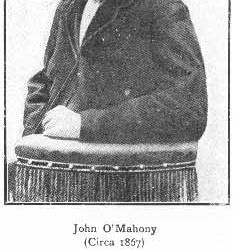
The name Fenian traces back to the Fianna, which is pretty badass.
O’Mahony had taken part in the Young Irelander Rebellion of 1848, which was when a bunch of 19th-century Irish Gen Zers decided to attack the cops, but failed because the cops, by virtue of being aligned with Britain, had more manpower, more weaponry, and also probably weren’t Literally Starving due to crop failures. Due to the aforementioned starvation and also having been kicked out of Britain for being too Irish, O’Mahony moved to the United States in 1854.
Up to this point, every statement has probably made you think, “Cheers, I’ll drink to that.” I mean, who among us doesn’t want to free Ireland from the grip of tyranny? But brace yourself.
It’s April 1866. The United States has been re-unified for a year.
The Fenian Brotherhood is invading Canada.
Why? you may ask. How? is also a valid question, and easier to answer: with all that military experience acquired during the Civil War, and also the guns. I don’t know exactly which guns, but probably something cool like Spencer repeating rifles or Springfield rifles. Whatever they were, they gave the Fenians the confidence they needed to look at our great big, cold neighbor to the North and think: “Yeah, I could fuck with that.”
If you aren’t aware, you don’t fuck with Canada. You can’t fuck with Canada. Americans have tried. In 1775, General Richard Montgomery -- who was also, coincidentally, Irish -- died in Québec and all he got for it is a cool painting where he looks like Jesus. In 1812, Brig. Gen. William Hull and his severely under-equipped army tried to convince Canadians to leave Britain; RIP to William Hull but the Canadians said no thank you, and chased him out of their country. There’ve been a few other skirmishes here and there, but suffice it to say that Canada is truly the Russia of North America.
The Fenians were different, though, in that they had no government backing and therefore were even more poorly equipped to invade Canada than those other guys.
As for why: they wanted to hold Canada hostage and then hold a sort of prisoner transfer, except for political entities instead of human beings -- Canada for Ireland.
Their first target: Campobello Island. Why choose this target? I suspect it’s because they wanted to start with something small to boost confidence. If you try to bite off more than you can chew right off the bat and fail immediately, it really kills the groove, y’know? Campobello Island’s biggest claim to fame, besides that it was once invaded by Irish-Americans, is that future president Franklin Delano Roosevelt may have gotten polio there in 1921. Which means that in 1866, before the raid, it had absolutely no claim to fame.
So, anyway, about 700 Fenians set off for Campobello Island and failed immediately. They never even landed on the island because British warships showed up and they dispersed.
A couple months later, in June 1866, they tried again, but bigger this time. Led by Colonel John O’Neill (played by Richard Dean Anderson in the television adaptation), about 1000 Fenians crossed the Niagara River into Canada West (now Ontario). The USS Michigan was deployed and cut off O’Neill and his men from supplies and reinforcements. From now on, they were on their own.
And they actually did kind of a good job, for a relatively small force of men with no legitimate backing invading a foreign nation. O’Neill’s army occupied Fort Erie and then managed to ambush some (admittedly inexperienced) Canadian volunteers of the militia and the Queen’s Own Rifles of Toronto. Both forces were about the same size, but as the Torontonians (is that right? Chrome wants to change it to Estonians) were total noobs and the Fenians were veterans of the bloodiest war in United States history, the Fenians...actually won. The Battle of Ridgeway has its own Wikipedia article, and according to it it’s “the only armed victory for the cause of Irish independence between the Irish Rebellion of 1798 and the Irish War of Independence in 1919,” which kind of sucks, considering it was fought by a rag-tag bunch of idiots.
The Fenians went back to Fort Erie and some more fighting occurred, but none of that’s as interesting as the fact that a Canadian officer, Lt. Col. John Dennis -- yes, all three people I’ve introduced so far have been named John -- apparently deserted his men, fled to a house, stripped off his uniform, and shaved his “luxurious sideburn whiskers,” which is just the sort of bonkers shit you love to see in an account of a military action. Also, 2nd Lieutenant Angus MacDonald, boy detective, was there.
It’s fitting that Fort Erie was then known as Waterloo, because that’s where it all fell apart for our heroes. The British were coming, and Colonel O’Neill was, I’m sure, no quitter, but he was one to bravely run away to fight another day. The Fenians retreated back to New York State and surrendered to the U.S. Navy.
The U.S. government began to crack down on wayward Irish rebels, and President Johnson went so far as to issue a proclamation, for all the good it would do. Because of these crackdowns and the ensuing arrests of many Fenian leaders, the planned raids into Canada East (now Québec) were thwarted.
In 1870 and ‘71, the Fenians returned to their old mischief and began raiding Québec and Manitoba, but they just didn’t have the same magic as the first raids. This time ‘round, the Fenian Brotherhood had been infiltrated by British and Canadian spies, which made it near-impossible to execute any plans. Our old friend John O’Neill was arrested by a U.S. Marshal in 1870 after the Battle of Trout River (which involved the 69th [nice] Regiment of Foot [not so nice]), but he and other Fenians were pardoned by President Grant.
And so ends this tale, lost to time. Oh, but also, Kate Beaton did a comic on it.
#mine#us history#canadian history too........but i don't have a tag for that#apparently they /do/ learn about this in canada but for SOME REASON they don't teach it in the states#long post#can u tell i got tired in the middle of it aksksddf
2 notes
·
View notes
Text
Cerebus #5 (1978)
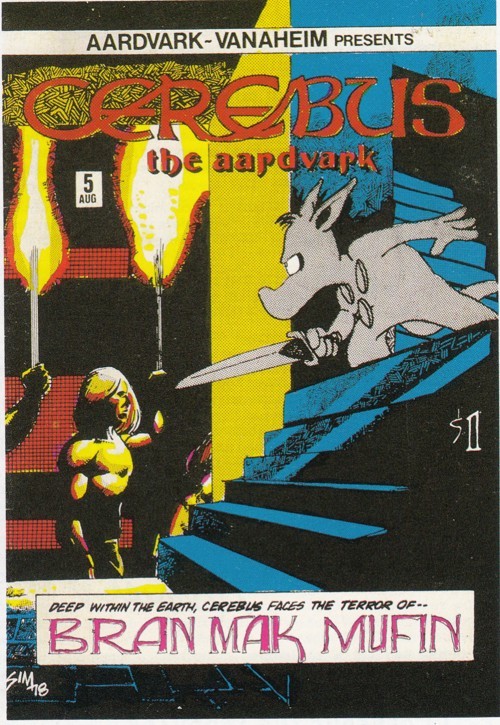
It seems improbable that this comic book would run for 300 issues.
The United Kingdom has way too much history for such a small island. And being American, I know about 3% of it. I know there were some kings and queens, some named Elizabeth and others named George and then some guy named Oliver who fit in there somehow despite not being a king or queen. I know there are four nationalities that make up the country: Scottish, Irish, Welsh, and the boring one. I know there's a dragon on the Welsh flag and their language has too many consonants, probably because they spent so much time in mines. I know the Scottish only eat deep fried Mars bars. I know the Irish had some troubles because some of the Irish aren't British or something. And I know all the stupid political crap the American Republican party are going to do because they simply follow the Tory playbook a few months to a year after the Tories have pulled some racist bullshit. And it's not just the Tories! Seeing what the centrist Labour party members did to sabotage their own party is simply a window into what our centrist Democrats would love to do to the Leftists (and may have done! But they just haven't been exposed yet like the jerks in the Labour party). Also, and this might not seem like British History so much as a personal experience, I once fist bumped Jimmy Carr after he made a joke about me fucking pigeons. That was only one of the many times he took the piss out of me at the show. But I knew what I was getting into when I purchased front row tickets for Jimmy Carr.
All that being said (terribly summed up and horribly accounted), I knew even less when I first read this story at 21. I didn't know the "Pigts" were a pun on "Picts." I just thought it was a stupid name for a loin cloth wearing tribe of people named after breakfast foods. That was good enough for me! But maybe this issue will be even funnier if I read the Wikipedia entry on Picts! Or scan the entry, at least. Or, at the very least and the most probable option, click on the link, read a few sentences, and realize I don't really care that much.
I should probably read more non-fiction so that I actually know things about the world rather than reading another Lando Calrissian book until I know all the rules to Sabacc.
In "A Note from the Publisher," Deni Loubert explains how this issue of Cerebus caused a lot of stress between the publisher and the artist due to money concerns. But in the end, Deni put in a lot of her money and solved the problem. I guess one of the few things Dave found possible to believe before breakfast was that his spouse would support him both financially and emotionally while he pursued his dreams.
Dave's Swords of Cerebus essay went on for more than one page in its original printing and whoever reprinted it here forgot that there were a few extra paragraphs. So it's reprinted incomplete. That's okay because the bulk of it is about all the shortcuts he takes in drawing rain and shadows and how it's evident, as you progress through the story, how much sloppier and lazier his art becomes. But at the end, Dave Sim supplies a Gil Kane quote which made him think long and hard about how he was developing the story of Cerebus. I'd like to scan the quote but it's cut off halfway through because, as I said, somebody forgot the second page of the essay. Luckily I just happen to own the second volume of Swords of Cerebus, so I'll just type it out in a block quote.
"The difference between a comic book and a novel is not labor, not effort, it's the values. In other words, there are no meaningful values in a comic book. The people in comic books are two dimensional people going through the most elementary kind of situations, not enough to sustain anybody's interest beyond an adolescent. A novel has characterization, it has suspense, it has a structured situation full of substantial values that will hold the interest of an intelligent person. That's what I mean. Those values, if they're properly translated — Harvey Kurtzman translated them into comics. His comics were literate, they were intelligent, they were humane, they were interesting, they were funny, they were everything."
There's a second paragraph to the quote but it just brings up more inaccurate things that can be debated ad nauseam. I could argue with a lot of what Gil Kane says but he sort of argues my point at the end anyway with his discussion of Harvey Kurtzman. Basically, it depends on the author and what the author wants to bring to the comic book. Sure, characterization of a character that isn't really supposed to change much because the fans want what the fans have been getting (Batman, for instance) can be tough to pull off. But Gil Kane gets at my main problem with comic book fans who follow characters, buying any story their favorite is a part of: the characterization and story are entirely dependent on the current writer. And some writers just don't fucking care about anything except shitting out another script so they get paid. You'll find a lot of good examples of those kinds of writers in the beginning years of DC's The New 52 as they pretty much hired all of the worst writers from Marvel to launch some of their New 52 titles. Comic books make it easy for writers to write two dimensional characters and be satisfied with the garbage they produce. Fans just want another Batman story. Just stick Harley Quinn in there and it'll sell fifty thousand copies easy. Who cares who writes it as long as they always make their deadline. But that's not a flaw of the medium of comic books! That's a flaw of the writers and/or fans!
The main takeaway with the Gil Kane quote is that it was nice that Dave Sim read it and thought about it and applied it to Cerebus. Maybe, at later points, he applies it too much! But if it got Dave to thinking about a larger story and a greater world chock full of characters with different ideologies and beliefs and motivations, I'll allow it to exist without being too hard on it.
That's a lot of words. I need to shove a picture in here already.
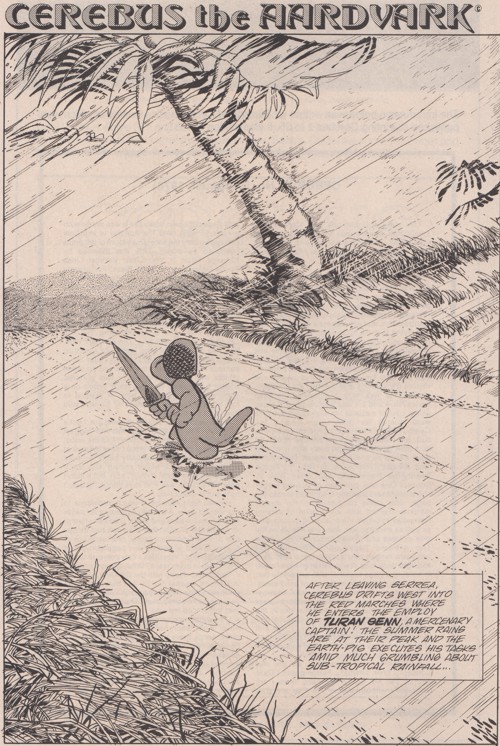
This is what Page One of a Cerebus comic book looked like before Gerhard. "Pretty fucking awesome," you curse like a sailor. Later, by page four when the horizon has disappeared and the rain is simply ruler-straight vertical lines, you'll be thinking, "When the fuck does Dave hire Gerhard?"
Cerebus has found himself in the Red Marches where he's about to learn a little something about Cerebus from a bunch of long haired shirtless dudes. It's almost like when I was 17 at my first Iron Maiden show surrounded by sweaty shirtless men while I listened to Iron Maiden sing "Sun and Steel" and I thought, "Is this history?" Then later they sang "Rime of the Ancient Mariner" and I was all, "I am learning!"
I'm so glad I'm writing on the Internet so I don't have to hear anybody say, "What are you talking about? How are those two things alike, you moron?!" Besides, I said it was "almost" like, imaginary jerkos!
The nearly naked men convince Cerebus to follow them back to their underground kingdom so he can meet Bran Mak Mufin, the greatest military leader in all of Estarcion. Plus he has an aardvark fetish so he's really going to want to meet Cerebus, no matter how badly Cerebus smells.
See, the joke in this issue (which Dave mentions at the beginning of the essay I didn't scan) is that Cerebus' fur smells terrible when it gets wet. It's pretty funny if you think about how bad that could be! Like, really bad! Ha ha!
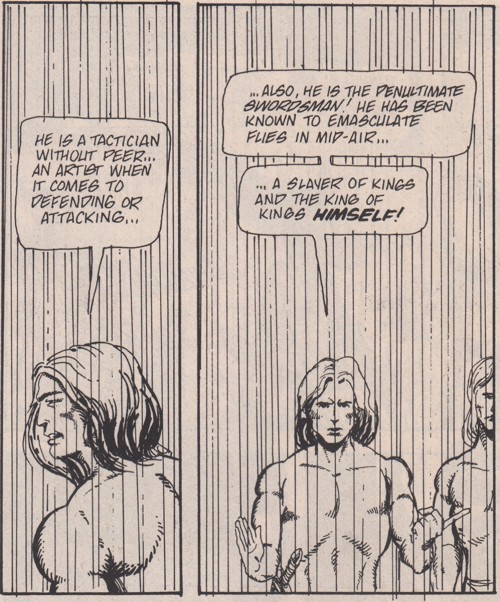
If he's so fucking great, why is he only the penultimate swordsman? My guess is because of Cerebus!
Look at that rain! That's the rain of an artist who doesn't fucking give a shit! When the fuck does Dave hire Gerhard?
Bran Mak Mufin takes one look at Cerebus and has the kind of orgasm you have when you realize the prophecy has finally been fulfilled. Man, those are the best orgasms.
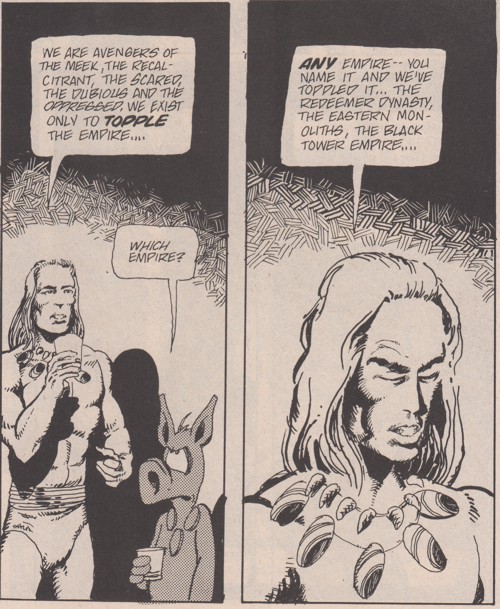
We could use a few good Pigts these days.
I'd forgotten this aspect of the Pigts. One thing I do remember is that Bran Mak Mufin was my favorite member of Cerebus's cabinet as Prime Minister. Wasn't he the only one to ever try to do the right thing? And doesn't he eventually walk away because of how terrible they're all acting? Or does he only finally leave when he believes they're going to be defeated, thus exposing the weakness of his own faith?
Bran mentions the Black Tower Empire which, I'm assuming, is an empire which first caused the Black Tower to ascend, something Cerebus will manage later.
We learn Cerebus is 26 which probably made me feel good when I first read this in that way you feel youthfully immortal when the protagonist of the story is older than you. Now I'm twenty years older than that and I can tell you the feeling is best described as enervating.
Bran Mak Mufin offers to let Cerebus rest so they can talk refreshed in the morning. While trying to sleep, Cerebus hears some strange noises and heads off to investigate.
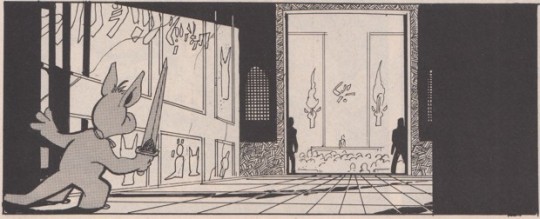
Notice the Cerebus-shaped heads on the walls. The Chosen One is about to discover he's the protagonist of this story.
I know there's a shot of a huge aadvark statue coming up that I could have scanned instead. I'm working my way up to that revelation!
Cerebus spies on a large gathering of Pigts (no more than fifty since that's the size of Bran's army) to learn that he's the reincarnation of some ancient God-King worshiped by the Pigts. The prophecy even says that he will come to them in his 26th year! Holy smokes! You couldn't write this kind of prophecy!
For a moment, Cerebus is tempted to assume the role of the Pigts' Redeemer God. I guess this is his "last temptation" moment. But his narcissism wins out over his greed. He would rather be Cerebus the Unique than Cerebus the Guy Who's Just Another Version of that Other Long Dead Guy. He smashes the statue that I forgot to mention and flees the Pigts' nonsense, heading towards Iest.
Nothing to say about Aardvark Comment. Just some aardvark lovers getting their aardvark love on. It was embarrassing.
Cerebus #5 Rating: B+. This issue is the first to give an inkling of something bigger happening across a longer story. It's still before Dave Sim decided he was going for 300 issues dedicated to the growth of the titular beast. But any time you can make the scope of the protagonist's world bigger, it makes for a more compelling story. I'm definitely more compelled after this issue!
0 notes
Text
Binge! Part 2: The Re-Binging
I’m often put off by long book series - considering how often I complain about being suckered into the first book of a series, this isn’t surprising. However, sometimes I’m willing to put in the time to binge a whole series.
Like, for example, the Barker & Llewelyn series by Will Thomas.
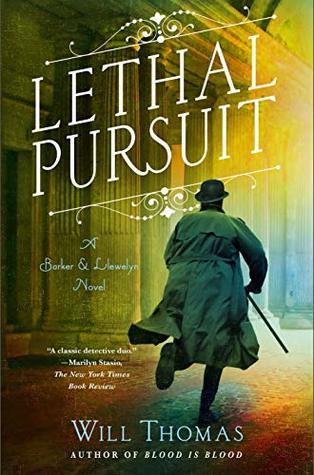
So I binge-read the first 10 books of this series (well, 10.5, there’s a novella called An Awkward Way to Die ) in one long, dizzying binge last year. And, lucky for me, there’s a new book out: Lethal Pursuit! Pretty much exactly one year from the release of Blood is Blood!
But! If you haven’t read the first 10.5 books, here’s a review:
BOOK 1 - Some Danger Involved: Your average detective enquiry agent-duo origin story featuring brilliant detective and his new snarky Welsh sidekick!
BOOK 2 - To Kingdom Come: Barker & Llewelyn go undercover and build bombs for the Irish!
BOOK 3 - The Limehouse Text: Barker & Llewelyn face big trouble in London’s 19th Century Chinatown!
BOOK 4 - The Hellfire Conspiracy: Barker & Llewelyn fight human traffickers, secret societies and such!
BOOK 5 - The Black Hand: Barker & Llewelyn fight the Italian mafia!
BOOK 6 - Fatal Enquiry: Barker & Llewelyn fight Barker’s almost comically evil arch-nemesis!
BOOK 7 - Anatomy of Evil: Barker & Llewelyn fight Jack the Ripper!
BOOK 8 - Hell Bay: Barker & Llewelyn Present: Agatha Christie’s And Then There Were None!
BOOK 8.5 - An Awkward Way to Die: Barker & Llewelyn solve a case in, like, 20 minutes!
BOOK 9 - Old Scores: Barker & Llewelyn Present: Japonism in Late-19th Century England!
BOOK 10 - Blood is Blood: Barker is put temporarily out of commission by an explosion! Llewelyn must solve the case himself! Who should show up to help but Barker’s long lost brother??
BOOK 11 - Lethal Pursuit: Barker and Llewelyn are hired by the Prime Minister himself to transport an ancient manuscript to Calais. Sounds easy enough! Except Barker seems more interested in investigating the death of the man who brought the manuscript to England in the first place…
So! Lethal Pursuit! It begins with Hillary Drummond, recently arrived to England from Germany (somewhat newly united! Kind of!) he’s on the run from some blue uniformed youths after the satchel he’s carrying, which contains this book’s MacGuffin an ancient, and very valuable manuscript. Drummond almost, almost makes it to the Home Office when, gasp! He’s run through with a sword. Then he walks into traffic and is run over by a cab.
Or, as it’s known in London traffic: Tuesday.
Meanwhile! It’s January! 1892! Llewelyn is a happily married man, as he loves to mention roughly every two pages. Along with being a happily married man (did he mention that he’s married now? Because he is) he’s also now a partner in Barker’s Detective Private Enquiry Agency. Barker has been moving a bit slower since his leg injury during the events of Blood is Blood, but, instead of treating Llewelyn like a full partner, Barker continues to treat him like an assistant. Which rankles Llewelyn a bit but hey, at least he’s married to the love of his life Rebecca. Only they still live in Barker’s house - he’s renovated the first floor for them and everything. Anyway, Barker and Llwelyn receive a summons from Prime Minister himself! The British government has the MacGuffin, and they want nothing more than to have the manuscript sent off to the Vatican archives and forgotten. But Barker is more interested in the mystery of who killed Hillary Drummond and why. Rather than immediately deliver the manuscript to Calais like the Prime Minister asked them to do, Barker hangs onto it. See, this manuscript is, apparently, a new gospel. Which is important because...reasons?
OK, so after 11 books, I’ve noticed that the Barker & Llwelyn series involve a lot more religion than I know anything about. I mean, when it comes to the religious category on Jeopardy, my answer is always “Jesus.” I’ve never read the Bible the whole way through - I read Acts of the Apostles in high school for an assignment, for which I had to actually go out and buy a Bible because the one we had was a family heirloom that couldn’t be opened without falling to pieces. In my lifetime I’ve attended a grand total of two church services - one when I was baptized at the ripe old age of 7 (I guess from ages 0-7 I was naught but a sinful hellbeast) and once in Germany I attended an Easter mass in a thousand year old cathedral because it was literally the only thing open on Easter Sunday in the whole town. Upper Franconia is suuuuper Catholic, you guys. Anyway, I took communion at that mass just to see what the body of Christ tastes like (burnt toast, I was disappointed). Does that mean I’m Catholic now? Hurray for gold-plated everything and indulgences? I mean, I’m not even 100% sure what I was baptized as back when I was a 7-yr-old unbaptized hellbeast…Lutheran, maybe? I think? I do enjoy posting lists of complaints on peoples’ doors. I mean, I could check, but that would require getting up and I both don’t want to and really don’t care all that much. Anyway, long story short: religion is not my strong suit. I don’t know the difference between a Baptist and an Episcopalian and a Methodist. Perhaps I should but honestly…eh. My point is, when Will Thomas writes about a manuscript that might be a new gospel written before Luke or Matthew or whoever...I just sort of smile and nod and go "yeah sure OK" and have zero idea what that might actually mean or its religious significance. I just hear “1000 year old manuscript” and think “that sounds awesome, gimme.”
Back to the book: this manuscript is so valuable, the people after it are willing to kill for it. Which puts Barker & Llewelyn in an awkward position. Even more awkward is the fact that Rebecca’s family, who seemed so cool in the last book, have now decided to shun her for marrying Thomas, a gentile. As usual, Barker & Llewelyn are caught between a rock and a hard place. Can they deliver the manuscript safely to the Vatican? Can Thomas repair the relationship between himself and his in-laws? Will Rebecca ever learn how to make a decent Pain au chocolat? Will we ever, ever meet Thomas’s massive Welsh family? Will Rebecca ever demand to get to know her small army of brothers- and sisters-in-law? Will Barker ever propose to Philippa? Will I ever learn the difference between various sects of Christianity? Find out tomorrow in Barker & Llewelyn: Lethal Pursuit! Same bat time, same bat channel!
I love this series. I am well and truly hooked. Barker & Llewelyn are a more down-to-earth Holmes and Watson. There is just the right amount of action, historical detail, and mystery to satisfy any Sherlockian desperate for some 19th century English mystery. I don’t know of any other book series, save Meg Cabot’s Princess Diaries series, where I’ve stuck around past the 8th or 9th book. So many books! Not enough time for serieses! I mean, sometimes I entertain the thought of binging all 900,000 Discworld books, but there are so many other things I’d like to read, too…I wish I were a faster reader. Better yet, I wish I could be like the Doctor and just flip through a book and absorb all its contents at once. That’d be awesome.
Still. I adore Barker & Llewelyn - I will absolutely be there for any book they’re in, even if the series goes the full Anne Perry and goes on and on for like, 20+ books. I’m here for it. And I am on pins and needles for the next book. I really, really, really want Thomas to reconcile with his family in Wales. I want Barker to actually acknowledge that Philippa Ashleigh is his girlfriend. I JUST WANT MORE, DAMN IT!
OK, for lack of anything else to say, let’s fancast this thing.
OK, so Barker would obviously be played by Graham McTavish, aka Dougal from Outlander.
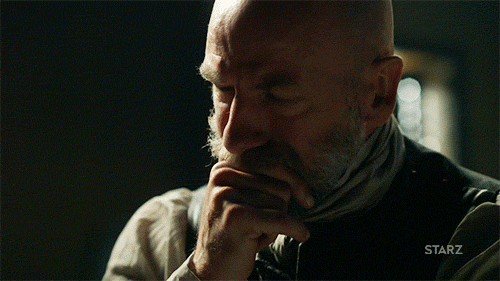
Admit it, he’d be absolutely perfect, right? Come on. I mean, just look at that face.
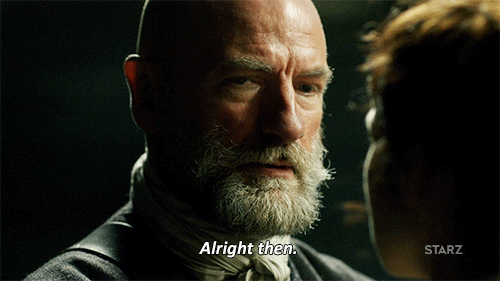
Thomas Llewelyn would be played by Taron Egerton because he’s Welsh and absolutely pretty and tough enough to be Llewelyn


Yesssss.

Mac would be played by Paul Ready because Paul Ready is beautiful and I love him and would cast him in anything. Plus, I could see him as the finicky perfectionist Mac. Plus, I still ship Mac/Thomas, and I think he’d play well against Taron Edgerton. By which I mean they’re both gorgeous and I’d enjoy watching them.

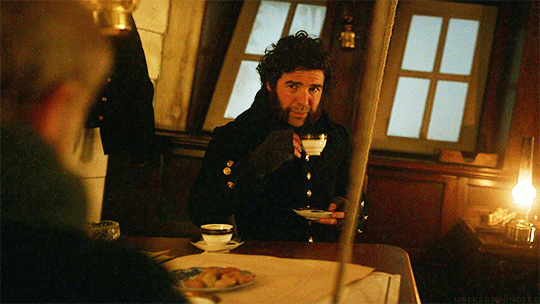
Jeremy Jenkins would be played by Adam Nagaitis because he’s awesome and he’d be perfect as the squirrley / drunk half the time Jenkins.


Ho would be played by Benedict Wong because he would be perfect, though I’m not sure if my fantasy BBC/ITV/Netflix series budget would have enough money to get Benedict Wong. He’s got Marvel money now.
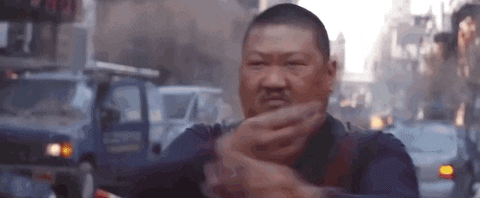

Rebecca Llwelyn nee Cowan nee Mocatta would be played by Jessica Brown Findlay because, eh, why not. I’m still traumatized/pissed off about Sybil’s death on Downton Abbey.
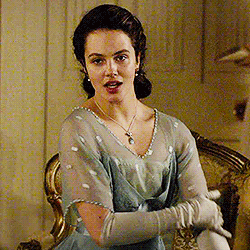
Tchéky Karyo as expert chef Etienne Dummolard because I can seriously picture him going into a long French tirade and throwing shit whenever Barker disrespects his cooking.
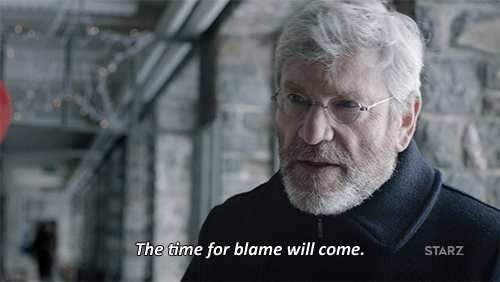
Michelle Gomez as Philippa Ashleigh, Barker’s Girlfriend, because I would love to see her and Graham McTavish as Barker snipe at each other.

Gemma Chan as Bok Fu Ying aka Miss Winter, Barker’s ward, because she is the perfect combination of elegance and badass.
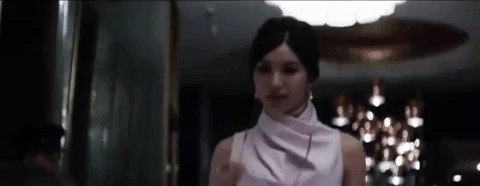
Gaten Matarazzo as Soho Vic because I’m absolutely sure he could pull off a British accent and annoy the shit out of Thomas,

And this dog as Harm. Look at this dog!

Awww!
RECOMMENDED FOR: Anyone fond of a fun 19th century mystery-solving duo.
NOT RECOMMENDED FOR: People who dislike mysteries, detective private enquiry agent duos.
OVERALL SERIES RATING: 4.5/5
TOTALLY UNBIASED VICTORIAN MYSTERY / MURDERINO FANGIRL RATING: 5/5
LETHAL PURSUIT RATING: 4/5
RELEASE DATE: November 12, 2019
ANTICIPATION LEVEL FOR NEXT BOOK IN THE SERIES: Olympus Mons
#barker & llewelyn#Some Danger Involved#To Kingdom Come#The Limehouse Text#The Hellfire Conspiracy#The Black Hand#fatal enquiry#anatomy of evil#hell bay#an awkward way to die#old scores#blood is blood#lethal pursuit#Will Thomas#historical fiction#historical mystery#great detective#Victorian London#19th Century#19th century england#19th century mystery#not sherlock holmes#book binge#book review#cyrus barker#thomas llewelyn#detective fiction#private enquiry agent
1 note
·
View note
Text
LONG POST BUT GOOD I THINK
Hello tumblr! I would like to take the time to explain some of this British/Irish politics stuff that is happening right now. I’m not an expert, but apparently neither is anyone else (including Theresa May), so I’m going to run down what I know, so that everyone who wants to understand can get up to speed (as much as I’m able to get you there). If anyone who is an expert wants to correct me or add anything then please, please do.
(Quick note: Remember that the UK is a country, but it also made of other countries including Northern Ireland.)
First, some history: Britain has had a very tumultuous relationship with Ireland basically forever. There’s a LOT to go over, so I’ll just kind of massively over-simplify and say that Ireland became a British colony and fought its way out until only 6 counties were undecided about being part of the UK.* Conflict known as The Troubles started in the ‘60s.
The Troubles: The counties of Northern Ireland consisted (and still consist) of a mixture of two key ideologies; those who considered themselves British (unionists), and those who considered themselves Irish (republicans).** The former, wanted Northern Ireland to stay as part of the UK, but the latter wanted Northern Ireland to rejoin the rest of Ireland as one sovereign state - they arguably settled into a kind of a ‘draw’*** in the 1920s. When the fighting began in the ‘60s, the republicans were, rightly, pissed that they were being discriminated against by the unionist authorities - they wanted to be treated fairly, and asking and then demanding it clearly wasn’t working, so they resorted to force. This kicked off thirty years of fighting, involving a variety of paramilitary groups, activists, Northern Irish police, politicians, and the British army. Thousands of people died (mostly civilians), and there was bombing throughout the UK. Eventually, after a lot of work, a peace-deal was brokered: The Good Friday Agreement (GFA).
The Good Friday Agreement: In order to bring an end to the both the fighting, but also the state-sponsored discrimination that started it, a contract was brought up between the republicans and the unionists. It’s pretty complex, but some key points are these:
A forced coalition of republicans and unionists must run the country
The majority of people want to stay in the United Kingdom but there are loooads who want to be part of Ireland: If there is ever a time when this switches, and the majority wants to unite with the Republic of Ireland, then the UK is bound to allow it.
(A reason this is so groundbreaking is because Britain had never before recognised that both these ideas were totally legitimate)
Key to this contract is the concept of ‘impartiality’. To properly manage a country with such distinct and opposing viewpoints, you have to be emphatically impartial between the two (and the legitimacy of both viewpoints therefore implicit). This is why the forced coalition is so important.
That was in 1998, and Northern Ireland has pretty much been peaceful ever since (there is the odd bombing every now and then) but obviously it’s kind of part of the whole deal that the two sides will never see eye-to-eye completely. Unfortunately...
Recent UK political history: I won’t go into too much detail, but basically the Conservative party were having a bit of a power struggle and David Cameron (the Prime Minister at the time) decided to sort it out by saying he’d hold a referendum about whether the UK should be part of the EU. And in 2016, he kind of had to follow through with that. It was a dumb decision with no forethought whatsoever, and the discussions around it were of the same ilk. Anyway, as we all know, without any idea what would happen once the decision was made, the UK slightly voted to Leave more than to Remain (this is known as Brexit because of course it is a dumb name like that). David Cameron resigned because whoops, and we got Theresa May - we didn’t get to vote for her or anything, we just got her.
This year, she decided she wanted a more firm support to go into Brexit negotiations with Europe, so she called a snap election. Elections are typically every 5 years and our last one was only in 2015, so it was early. LITTLE DID SHE KNOW, good old Jeremy Corbyn (who I could talk about at length as well but I won’t) and his Labour crew brought their A-Game, and destroyed the Tories as much as they could without actually winning the election.
Basically, Britain has a dumb system called ‘first-past-the-post’. The gist of it is as follows: Each political party has their own leader, and that leader becomes the prime minister if their party wins. When you go to vote, you vote for a local MP for your constituency (or local area) representing his or her party and that counts towards the national wins - or seats - of that party. For example, you might vote for a local Labour candidate and, if that Labour candidate wins, their seats are added to the Labour party seats to see whether or not the country wants them doing a good rule of the whole place. To have a strong mandate, i.e. to be large-and-in-chaaarge, a political party has to get a ‘majority government’ - this is defined as winning 326 seats. If they don’t get that, they must form a coalition with another party to pick up the seats that they’re missing - this tends to be the biggest party teaming up with one of the much smaller ones. In 2010 nobody got enough seats****, and the Tories took over from the Labour party by getting the Lib Dems into a coalition with them; then they somehow got even more control in the 2015 election by getting a majority government on their own little leggies (no Lib Dems required).
In this election, again, no party got enough seats - so the Tories had to try and get a coalition going. But there was a problem! All the other parties they could turn to, had said they would absolutely not form a coalition with them. WHAT TO DO? Well, remember we were talking about Northern Ireland earlier...
I KEEP THINKING I’M NEAR THE END AND THEN MORE INFORMATION IS HAPPENING: Northern Ireland has for a while been run by a coalition between the Democratic Unionist Party (DUP) and Sinn Féin. The former is unionist (obviously); the latter is republican. This had been going pretty well, till something called the Renewable Heat Incentive (RHI). This was a system to help businesses move towards renewable energy sources, thereby reducing UK carbon emissions. Essentially, businesses were given subsidies to change their heating methods over from non-renewable sources. But it was done in a shambolic way - people were basically being paid to just have their heat on aaaall the time, and there was no cap on subsidies so they could just heat their way to an unethical, but apparently perfectly legal, fortune. SCANDAL HAPPENED when it was revealed that this whole thing was going to cost Northern Ireland huuuundreds of millions of pounds and also look what a hash job everyone has done. Arlene Foster, leader of the DUP was asked to stand down while an enquiry happened but she refused and, in protest, the leader of Sinn Féin (Martin McGuinness) resigned from his post (and then subsequently resigned from the party and then died). Sinn Féin refused to put someone else forward to lead their half of the coalition, so Arlene Foster couldn’t lead either! Northern Ireland, therefore, had to have an election even though they had JUST HAD ONE in 2016. So they had another in March and the unionists headed into shaky ground - they lost a whole lot of seats, so only had one more than Sinn Féin. Sinn Féin continued to demand that Arlene Foster step down, and Arlene Foster continued to refuse, meaning they still couldn’t form a government. They were given a deadline to form one, or they would be put under Direct Rule (this means Westminster taking over running Northern Ireland), which is NOT IDEAL considering. (Also Brexit is happening!!! Ireland is part of Europe!!! The Northern Irish border with Ireland is a sensitive thing!!! Nobody talked about this during Brexit and they’re all fucking idiots!!!) The deadline passed, so they extended the deadline... And then Theresa May called a national election! WHAT A CLEVER CLOGS. This fucking idiot called an election in the most unstable time in Northern Ireland since the fucking ‘90s. Northern Ireland now has to go back to the polls once again! So they push back the deadline some more and then the election happens and GUESS FUCKING WHAT...
CLUSTERFUCK: Theresa May, a monumental shitshower of idiocy, doesn’t have enough seats to run the country, and nobody wants to team up with her horrible party, and now she’s fucked! But WAIT, what about the party that is embroiled in a corruption scandal and is currently unable to run its own country? That’s a good idea. Let’s get them involved. Theresa May and the DUP decide to join up.
Now. Remember a little thing from nearer the beginning of this stupidly long post: The Good Friday Agreement? The culmination of years of peace-process discussions after and through decades of war and terror? The thing the relies on an impartial government? How impartial is the Tories getting in bed with the DUP - the unionists? Not very impartial, if you don’t mind me saying. So now not only is Northern Ireland in a mess over the Cash for Ash scandal, and unable to run itself, but ALSO Theresa May is shitting all over the only real thing that’s kept the peace for nearly 20 years. And we still don’t know what’s happening with the Ireland/NI border! And we still have a deadline for a NI government to be sorted out! And the official plan for when that doesn’t happen is Direct Rule! And you can’t possibly run Direct Rule with one of the coalition parties that is refusing to run the fucking country! And Direct Rule is kind of kryptonite for GFA anyway! IT’S A FUCKING LUDICROUS, ILLEGAL, DANGEROUS MESS.
And that’s all I have to say about that.
-----------------------------------------------------------------
*That’s not exactly what happened. Ireland was colonised, fought for home rule (which is like being in charge of their area, while still be a British colony), and was partitioned in the 1920s because lots of people in these few Northern counties wanted to be ruled by the British government. The Irish Free State was created soon after, and Northern Ireland had the option to be part of that as well, but their government decided nah.
**This divide invariably fell along Protestant vs Catholic lines which lots of wilfully ill-informed British people will tell you is all the fighting was about. Actually there is a very long history related to this divide, which involved purposeful subjugation of Catholics in Ireland, to the point that the Irish Potato Famine could be considered attempted genocide of Irish Catholics by the British (protestants).
***Northern Ireland has since had the right to leave the UK if that’s what its people want, but that hasn’t happened and... Well, read on.
****This is known as a ‘hung parliament’. Hung parliaments do not happen a lot. there was one in 2010, as detailed above, and I think the one last before that was way back in the ‘70s.
#british politics#DUP#Theresa May#general election#ge2017#history#politics#DUP coalition#Brexit#David Cameron
77 notes
·
View notes
Text
Women In History
I grew up believing that women had contributed nothing to the world until the 1960′s. So once I became a feminist I started collecting information on women in history, and here’s my collection so far, in no particular order.

Lepa Svetozara Radić (1925–1943) was a partisan executed at the age of 17 for shooting at German soldiers during WW2. As her captors tied the noose around her neck, they offered her a way out of the gallows by revealing her comrades and leaders identities. She responded that she was not a traitor to her people and they would reveal themselves when they avenged her death. She was the youngest winner of the Order of the People’s Hero of Yugoslavia, awarded in 1951
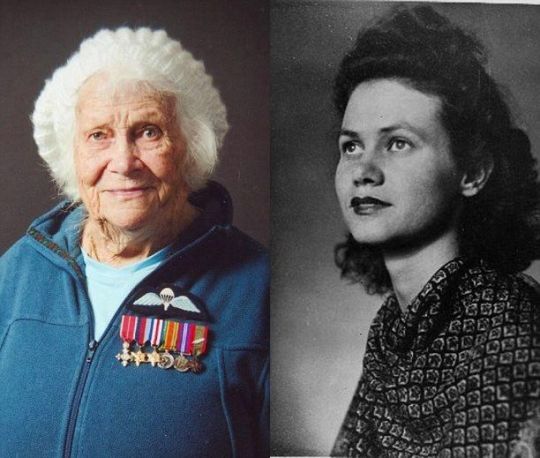
23 year old Phyllis Latour Doyle was British spy who parachuted into occupied Normandy in 1944 on a reconnaissance mission in preparation for D-day. She relayed 135 secret messages before France was finally liberated.

Catherine Leroy, War Photographer starting with the Vietnam war. She was taken a prisoner of war. When released she continued to be a war photographer until her death in 2006.
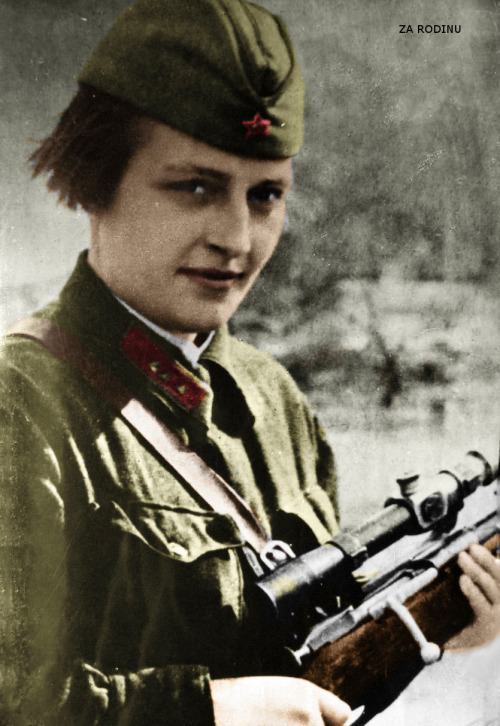
Lieutenant Pavlichenko was a Ukrainian sniper in WWII, with a total of 309 kills, including 36 enemy snipers. After being wounded, she toured the US to promote friendship between the two countries, and was called ‘fat’ by one of her interviewers, which she found rather amusing.

Johanna Hannie “Jannetje” Schaft was born in Haarlem. She studied in Amsterdam had many Jewish friends. During WWII she aided many people who were hiding from the Germans and began working in resistance movements. She helped to assassinate two nazis. She was later captured and executed. Her last words were “I shoot better than you.”.
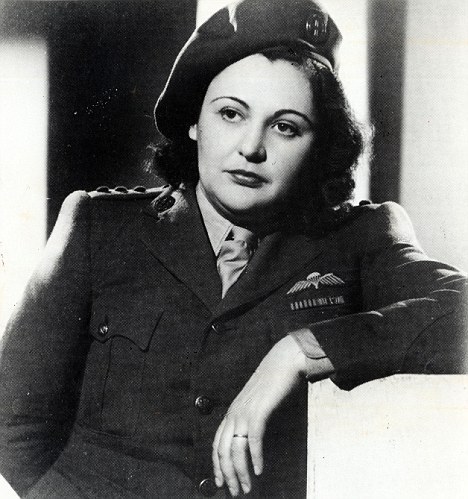
Nancy wake was a resistance spy in WWII, and was so hated by the Germans that at one point she was their most wanted person with a price of 5 million francs on her head. During one of her missions, while parachuting into occupied France, her parachute became tangled in a tree. A french agent commented that he wished that all trees would bear such beautiful fruit, to which she replied “Don’t give me any of that French shit!”, and later that evening she killed a German sentry with her bare hands.
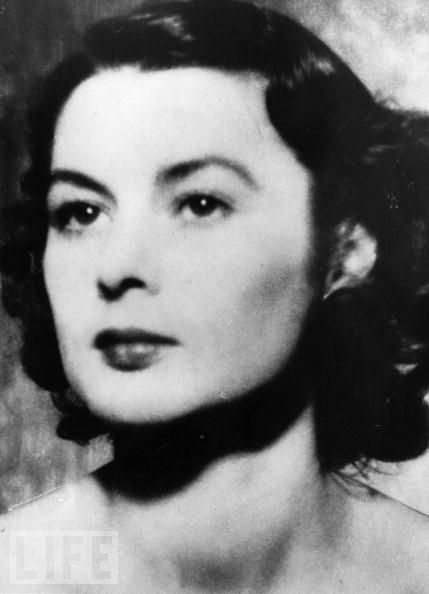
After her husband was killed in WWII, Violette Szabo began working for the resistance. In her work, she helped to sabotage a railroad and passed along secret information. She was captured and executed at a concentration camp at age 23.
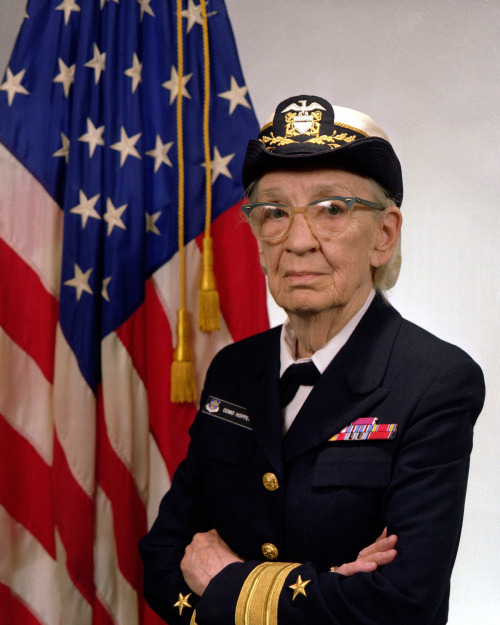
Grace Hopper was a computer scientist who invented the first ever compiler. Her invention makes every single computer program you use possible.
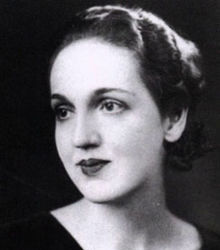
Mona Louise Parsons was a member of an informal resistance group in the Netherlands during WWII. After her resistance network was infiltrated, she was captured and was the first Canadian woman to be imprisoned by the Nazis. She was originally sentenced to death by firing squad, but the sentence was lowered to hard lard labor in a prison camp. She escaped.
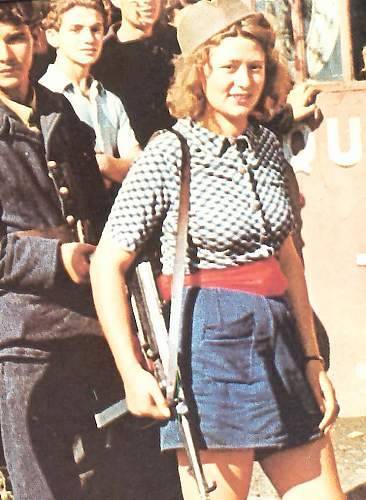
Simone Segouin was a Parisian rebel who killed an unknown number of Germans and captured 25 with the aid of her submachine gun. She was present at the liberation of Paris and was later awarded the ‘croix de guerre’.
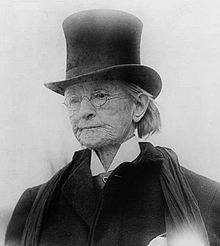
Mary Edwards Walker is the only woman to have ever won an American Medal of Honor. She earned it for her work as a surgeon during the Civil War. It was revoked in 1917, but she wore it until hear death two years later. It was restored posthumously.
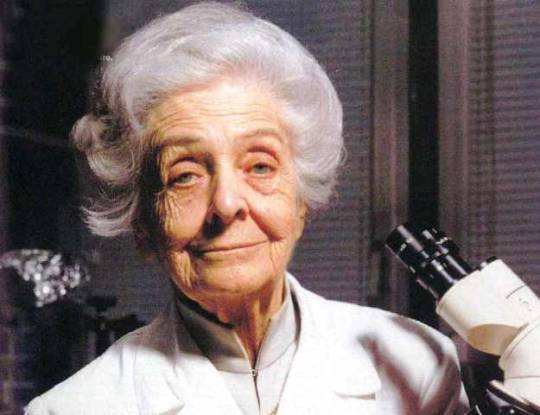
Italian neuroscientist won a Nobel Prize for her discovery of nerve growth factor. She died aged 103.
EDIT
jinxedinks added: Her name was Rita Levi-Montalcini. She was jewish, and so from 1938 until the end of the fascist regime in Italy she was forbidden from working at university. She set up a makeshift lab in her bedroom and continued with her research throughout the war.
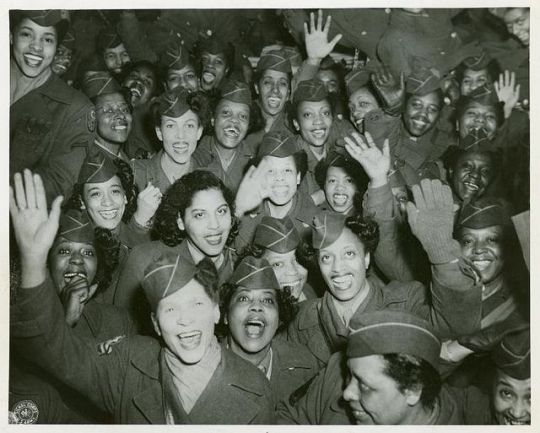
A snapshot of the women of color in the woman’s army corps on Staten Island
This is an ongoing project of mine, and I’ll update this as much as I can (It’s not all WWII stuff, I’ve got separate folders for separate achievements).
File this under: The History I Wish I’d Been Taught As A Little Girl
1 note
·
View note
Note
The constitutional question regarding the immigration ban is actually far more complicated than just "The President has the power to make temporary stays on immigration". There are 5th amendment Due Process issues (did the feds jump through enough procedural hoops when they temporarily banned Middle Easterners from entering the US?) and Equal Protection issues (is the government discriminating against them on an impermissible basis?), each of which apply to the President as much as Congress.
[To continue: the Constitution may be a short document, but there are REAMS of additional law that spring out from it by virtue of the fact that the Supreme Court has been interpreting it (and thus defining and expanding it) for centuries.]
Naturally, naturally. Fortunately the Justice Department has a literal army of government lawyers to argue the fine points of all that shit, and even if lower Federal courts shoot it down, they can appeal directly to SCOTUS, which is soon going to have a new Trump appointee on it, giving it a 5-4 Republican majority again.
Now it’s entirely true that Law is, for the most part, a series of never-ending knife fights over definitions, and the entire point of using precedent is so we never have to have the same knife fight twice (hopefully.) This is why they pay lawyers big bucks to memorize the most famous knife fights of all that affect current-standing interpretations. That said, I think reading the actual damn document can still be pretty illuminating.
For starters, the first article of Amendment 14 with both the due process and equal protection clauses say thus: “No State shall make or enforce any law which shall abridge the privileges or immunities of citizens of the United States; nor shall any State deprive any person of life, liberty, or property, without due process of law; nor deny to any person within its jurisdiction the equal protection of the laws.“
Due Process then applies to citizens, i.e. not anyone affected by the immigration moratorium by definition, and equal protection requires the affected to be within their jurisdiction, and when you’re still standing on the other side of an international border (like a port - including an airport,) you’re pretty definitely on the other side of the border. More importantly, application of the Equal Protection clause in the US often rides heavily on the concept of protected classes. The shirtless and shoeless are not “protected classes” and may be refused service, but black people are - which causes problems when turning away a shirtless black man. It’s rather sweeping and arbitrary to single out some classes as protected while others aren’t, the kind of thing good law tries to avoid - but when you recall that the Equal Protection clause itself was drafted to prevent the widespread and systematic oppression of former slaves in the newly-defeated southern states, you can understand why it was the best option going. (Recall also that selective incorporation - a judicial powergrab that let the SCOTUS selectively decide that certain Amendments applied their limitations to state governments, not just the Federal government, was born at this time too. It was also arbitrary, and nobody was thrilled with that - but it was the only way to make the 13th [ban of slavery] and 14th [ban on de-facto slavery + fuck you, Johnny Reb,] actually stick.) That the Equal Protection clause was implemented specifically to protect a certain class, long decades before any classes were formally defined in the 1964 Civil Rights Act, illustrates how endemic to the clause the concept is.
Since Due Process is right out (nobody’s going to win a claim of being denied life, liberty, or property on the basis of being detained 18 hours, considering how many thousands the TSA has likewise treated in the past decade) the “unconstitutional” claim rides entirely on defining Trump’s immigration moratorium as discriminating against a protected class. The 1964 Civil Rights Act (which both defines protected classes, and what constitutes discrimination against them) can be read here:
https://www.ourdocuments.gov/print_friendly.php?page=transcript&doc=97&title=Transcript+of+Civil+Rights+Act+%281964%29
Title VI specifically address Federal programs and activities, which apparently means welfare assistance, job training and other such and sundry; not the actual discharge of a Federal Department's statutory duties:
https://www.hhs.gov/civil-rights/for-individuals/special-topics/needy-families/civil-rights-requirements/index.html
Note there’s examples there specifically addressing immigrants being discriminated against based on race and/or nationality, but it applies to their applications for benefits - not the decision to grant them a green card in the first place. It protects immigrants once they are in the country; it doesn’t affect the decision to admit them in the first place. The rest of the Act is a wash; none of it (equal voting rights, equality in public spaces and accommodations, equality in state-owned public facilities, desegregation of schools, and employment equality) have nothing do do with immigration.
So there’s nothing in the Civil Rights Act which forbids Trump’s moratorium in black and white. But since the concept of protected class is rather endemic to the EP clause anyway, it might still run afoul of the EP itself. Well, that’s easy enough - the nation-specific moratorium should run afoul of “national origin,” right?
Except the moratorium doesn’t halt visas for foreign nationals of the specifically prohibited countries from immigrating - it suspends visas for aliens from said countries:
http://www.npr.org/2017/01/31/512439121/trumps-executive-order-on-immigration-annotated
So anyone who is 1. not a US Citizen and 2. trying to fly in from the listed countries will be refused a visa for the next three months. Their national origin does not (and should not) have anything to do with it - lots of people from outside the Middle East have made a pilgrimage there to fight for ISIS (and others, to fight against them:)
http://www.telegraph.co.uk/news/2016/03/29/iraq-and-syria-how-many-foreign-fighters-are-fighting-for-isil/
Note this Telegraph article’s note down at “12:12PM”
http://www.telegraph.co.uk/news/2017/01/30/british-dual-citizens-will-now-allowed-travel-us-boris-johnson/
“British citizens with dual nationality will be exempt from Donald Trump's immigration ban British citizens with dual nationality will be exempt from Donald Trump's immigration ban if they are flying from the UK to the US, Government sources have said.” The focus is clearly on where they are physically coming from, not their national origin. You can be neon-white and waving an Irish passport, but if you’re stepping off a plane from Syria, ICE is going to place a call to Ireland to ask if Paddy Poindexter is on any law enforcement radars for posting pro-ISIS messages on Facebook before taking a sudden and unscheduled vacation to an active war zone. Is that discrimination? Sure. Is it discrimination based on color or national origin? No.
This is precisely why the media says “Muslim-majority countries” every time they mention the nations with the moratorium on them - because portraying Trump’s executive order as racist is the only real chance they have (and it’s what they all believe of him personally, anyway.) They also demonstrate a charmingly moronic grasp of what an international border means. You can see both at work in this Politico article:
http://www.politico.com/magazine/story/2017/02/why-trumps-immigration-rules-are-unconstitutional-214722
“This means that all foreign travelers on U.S. soil—those waiting at U.S. airports, for example—are protected.”
This is so wrong there’s a damned Wikipedia article on it: https://en.wikipedia.org/wiki/International_zone#International_airports
And then they full retard:
“More than that, I’d argue that even Muslims not on U.S. soil are protected. Recent case law suggests that no act by a government official—no matter to whom it applies—can be based on disapproval of a race, ethnicity or religion. In other words, when it comes to Equal Protection, it’s the motive of the government and its agents that matters.”
Which directly contravenes the actual text of the Equal Protection clause itself, i.e. “nor deny to any person within its jurisdiction the equal protection of the laws.” It’s absolutely moronic to claim that the EP mandates the United States extend the equal protection of all its laws to people who are neither citizens nor physically here - literally every single SOB on Planet Earth. I’ll be there with a kazoo and pop corn to enjoy the hysterical screeching when SCOTUS winds up and bats that “case law” clean over the fence.
The Equal Protection clause has been egregiously abused almost as often as the interstate commerce clause, and some truly wild claims have been based upon it - and this one ranks up there with the best. The executive order might run afoul of Federal law yet - there’s eleven trillion of the things, and then the stack of knife-fight precedent built on each - but to run around screeching about how the Act is unconstitutional in breathless tones of horror does little more than to demonstrate how damn stupid most journalists really are.
3 notes
·
View notes